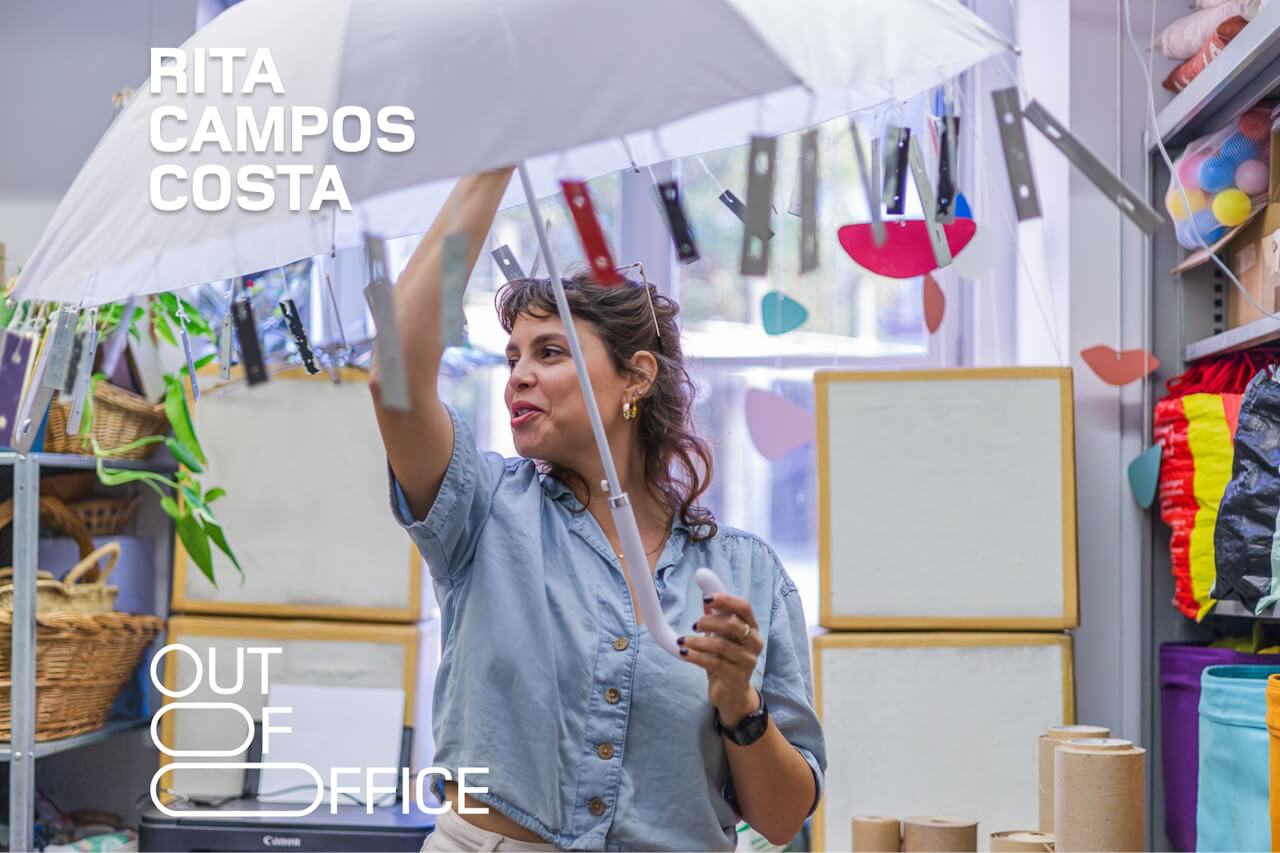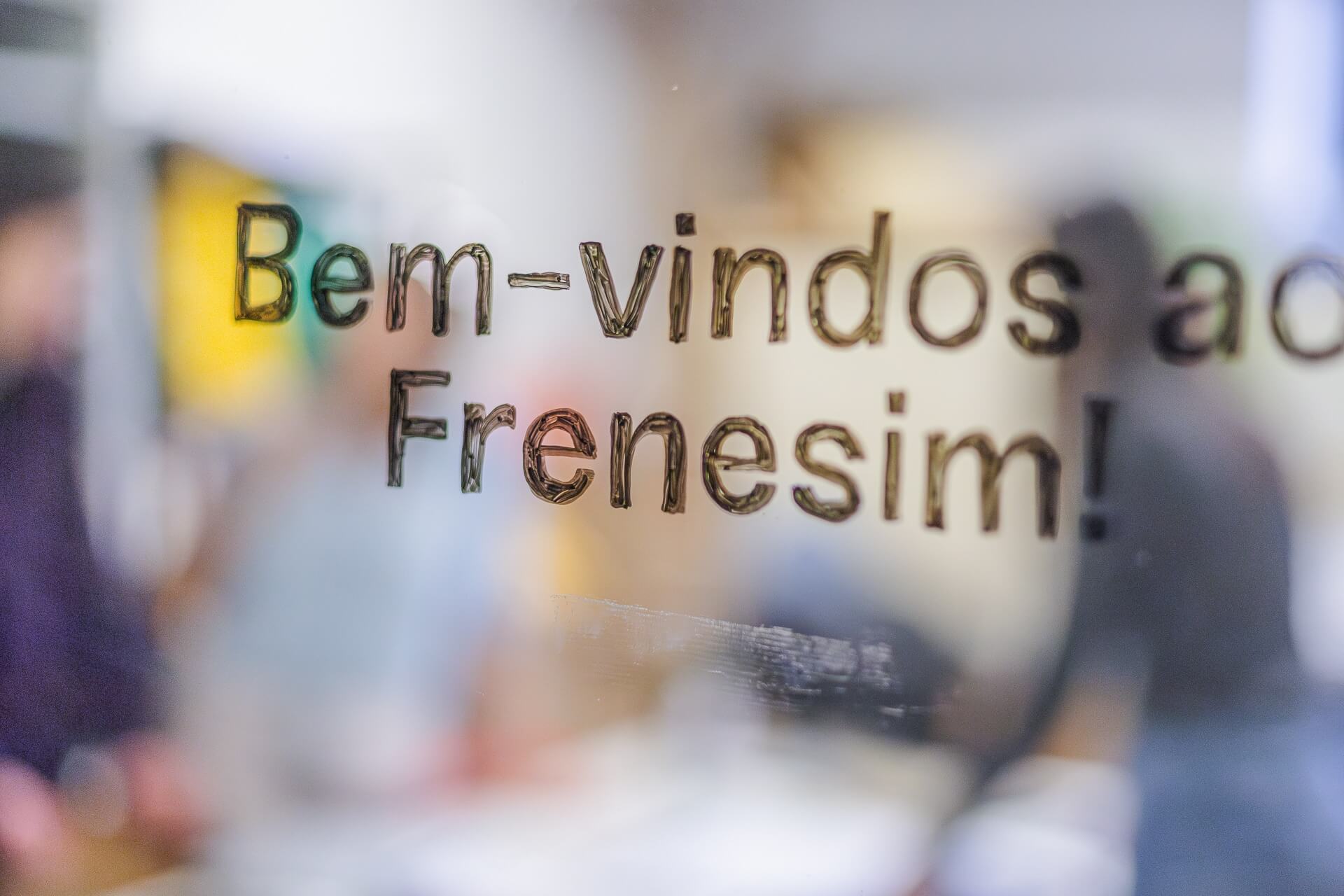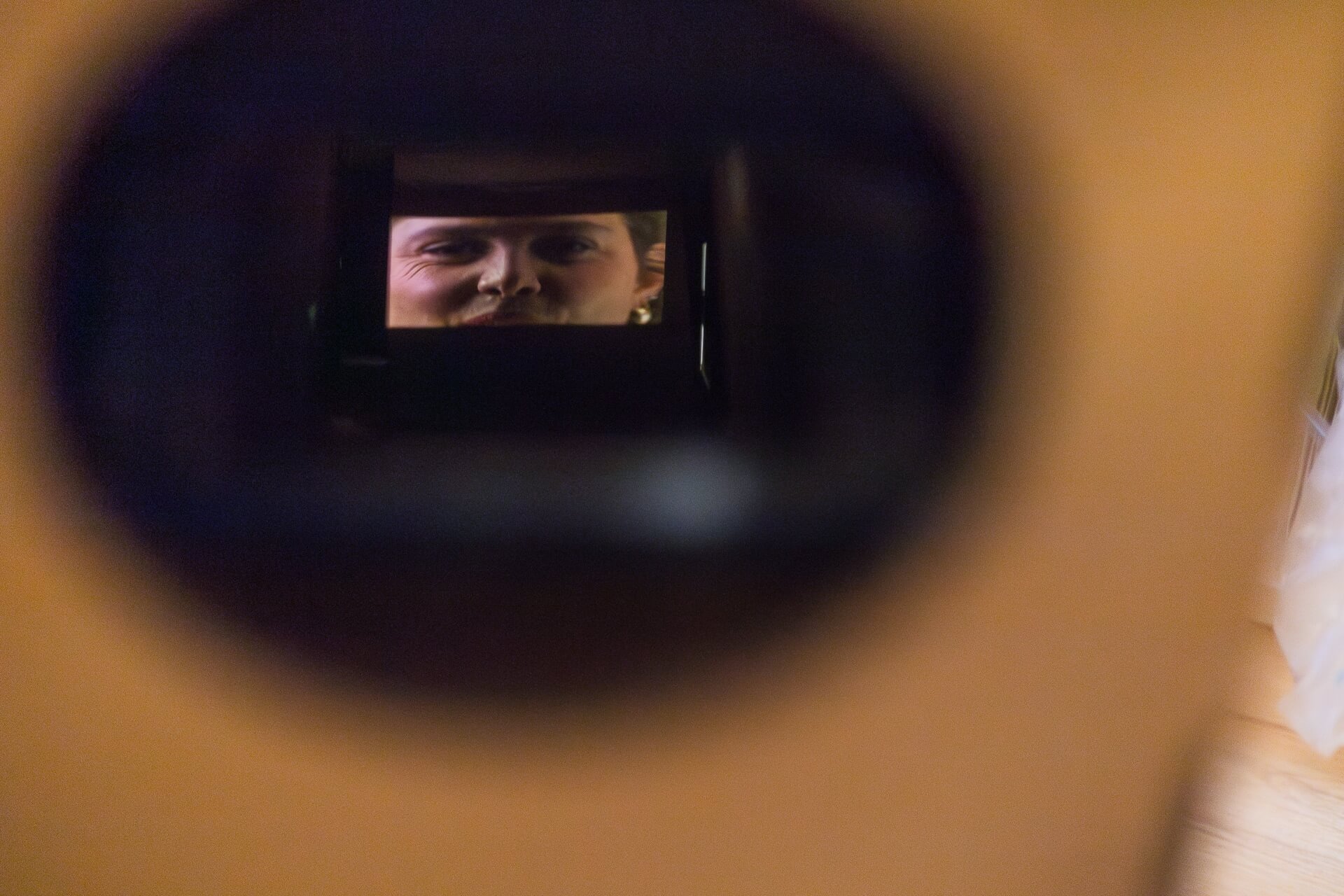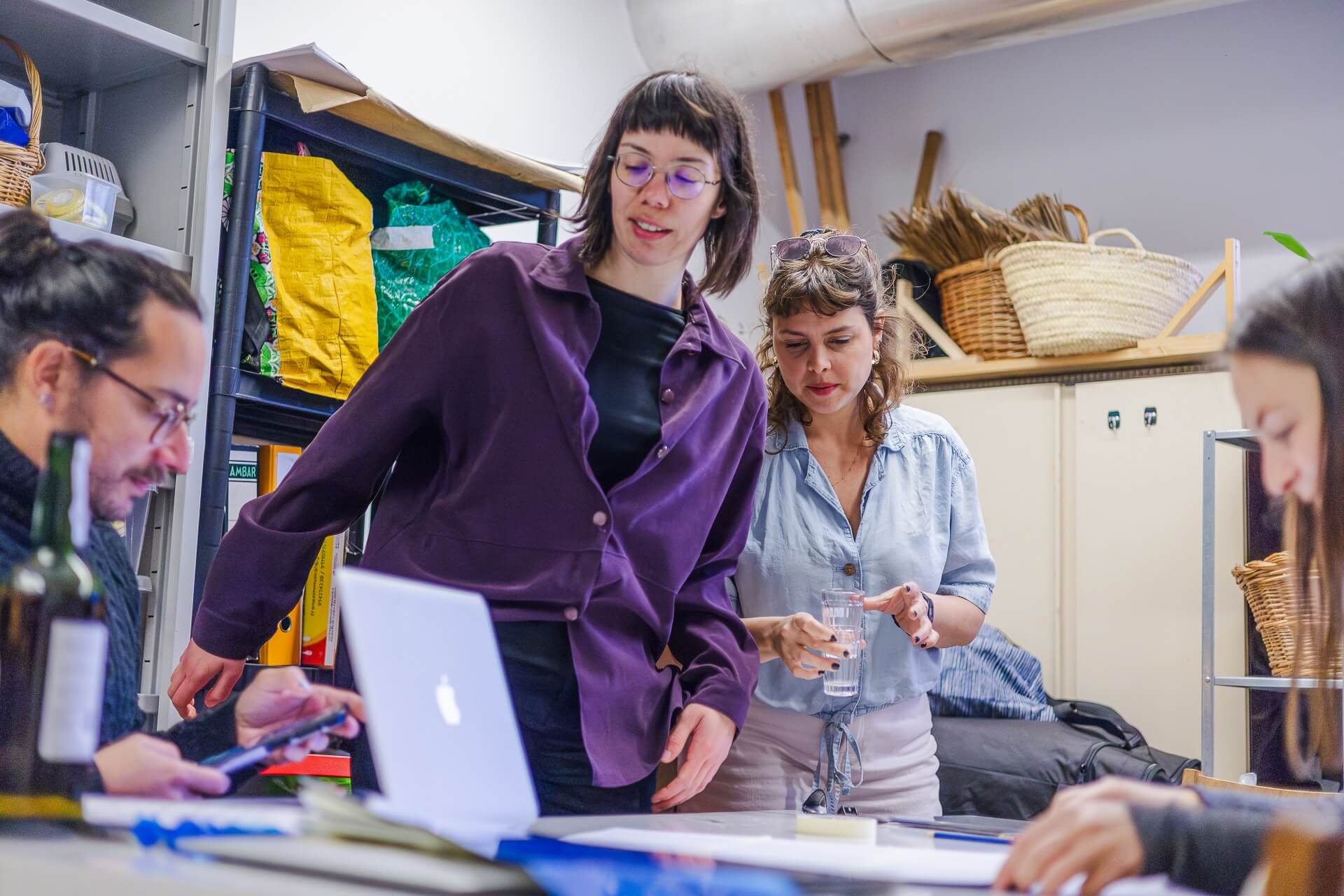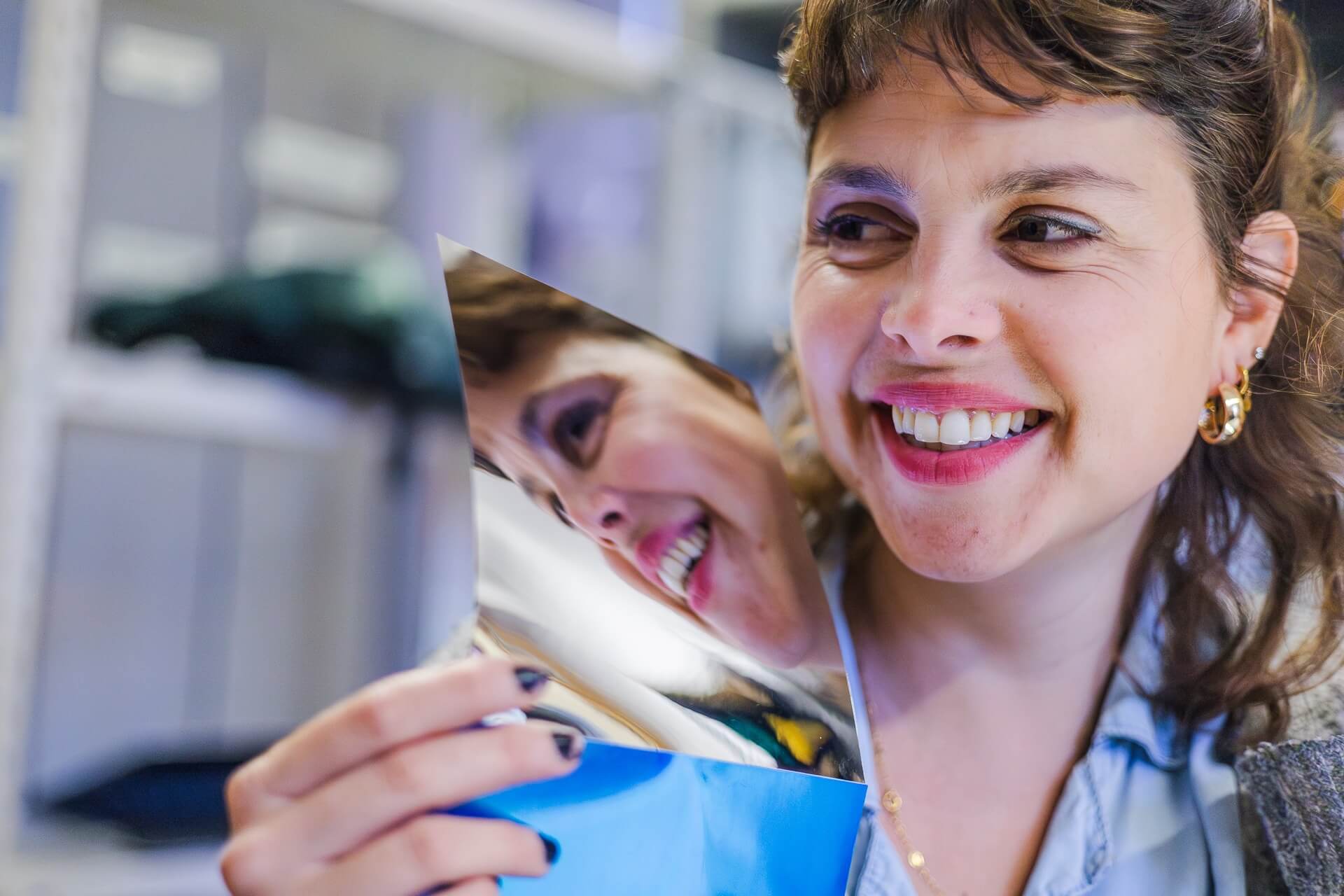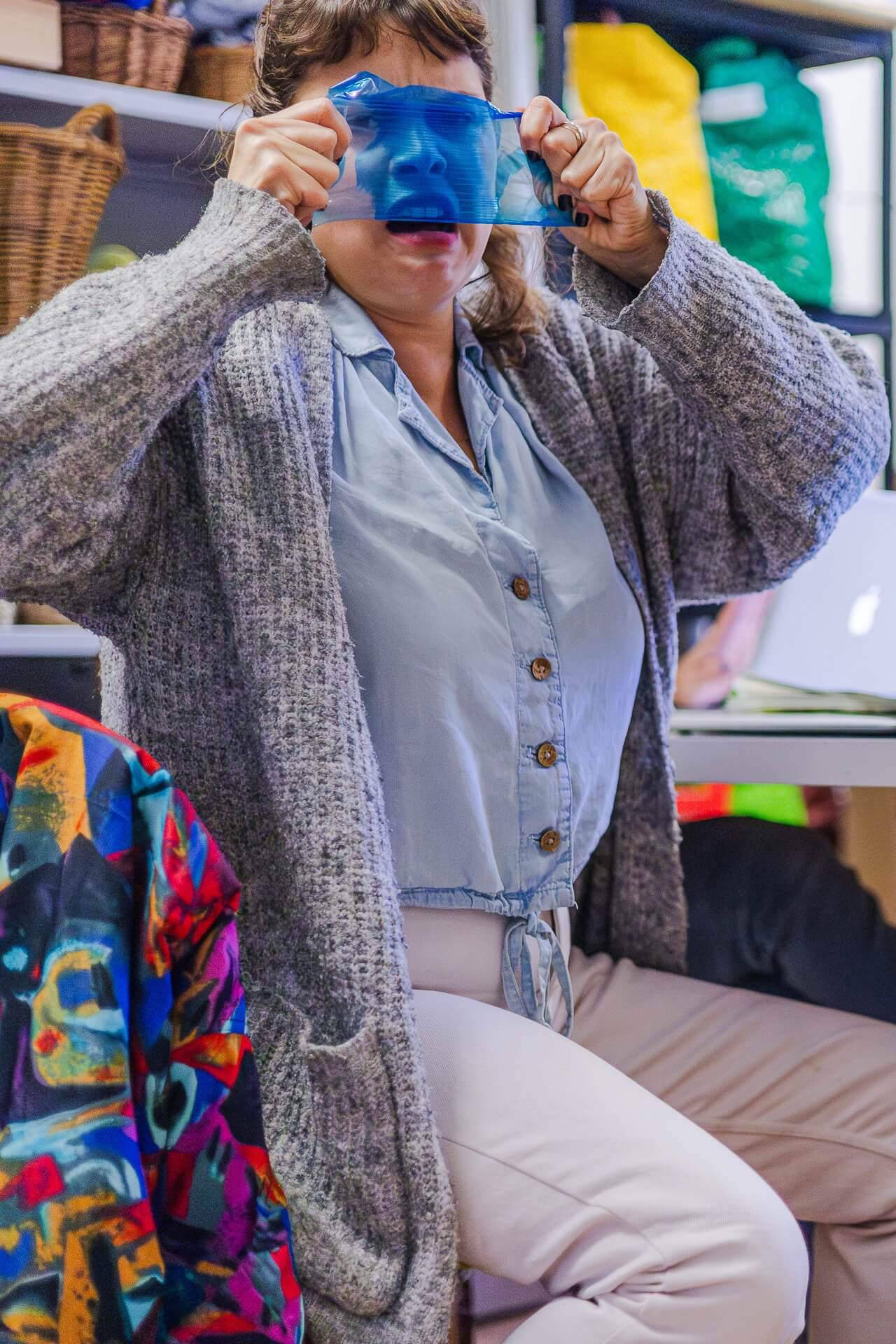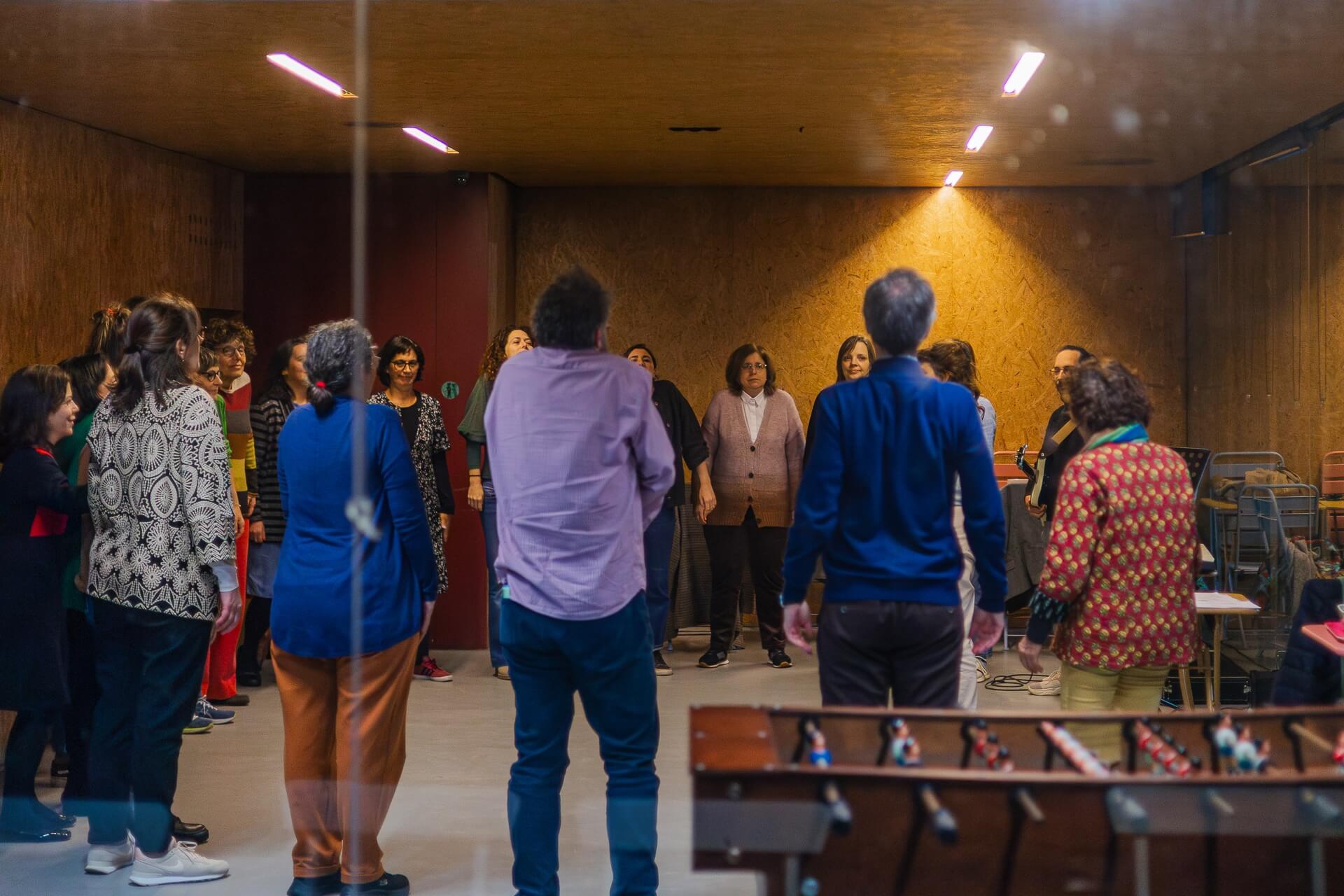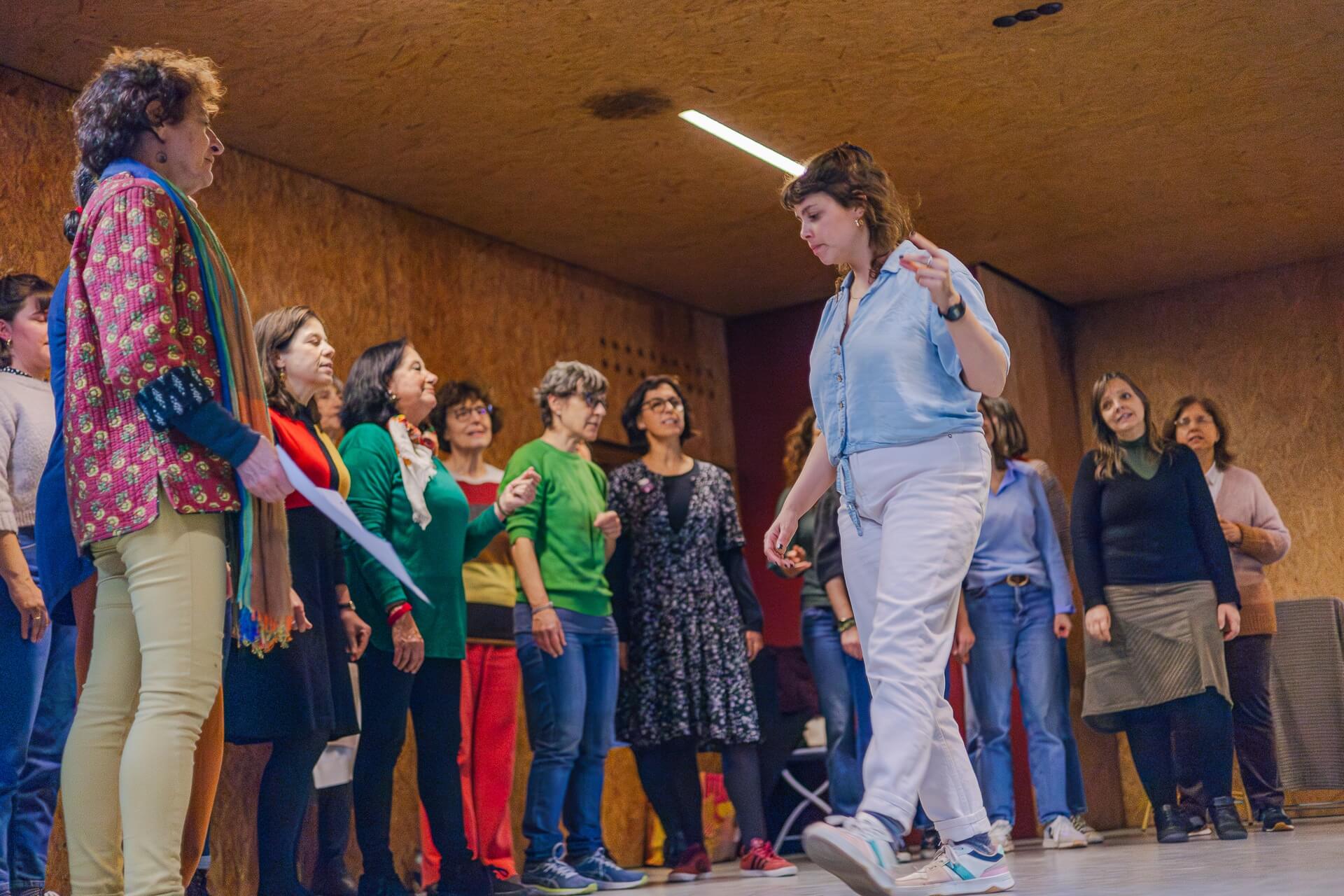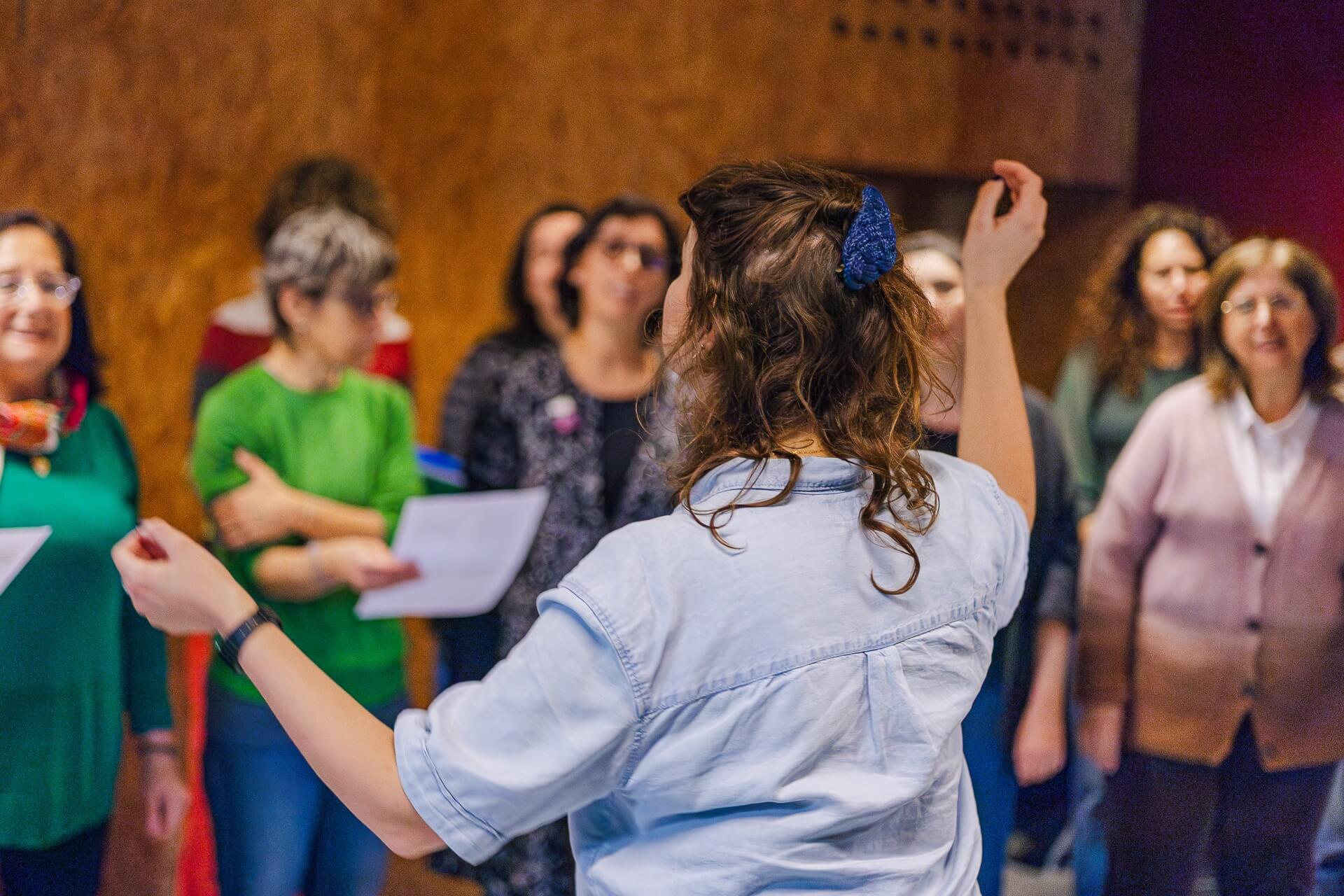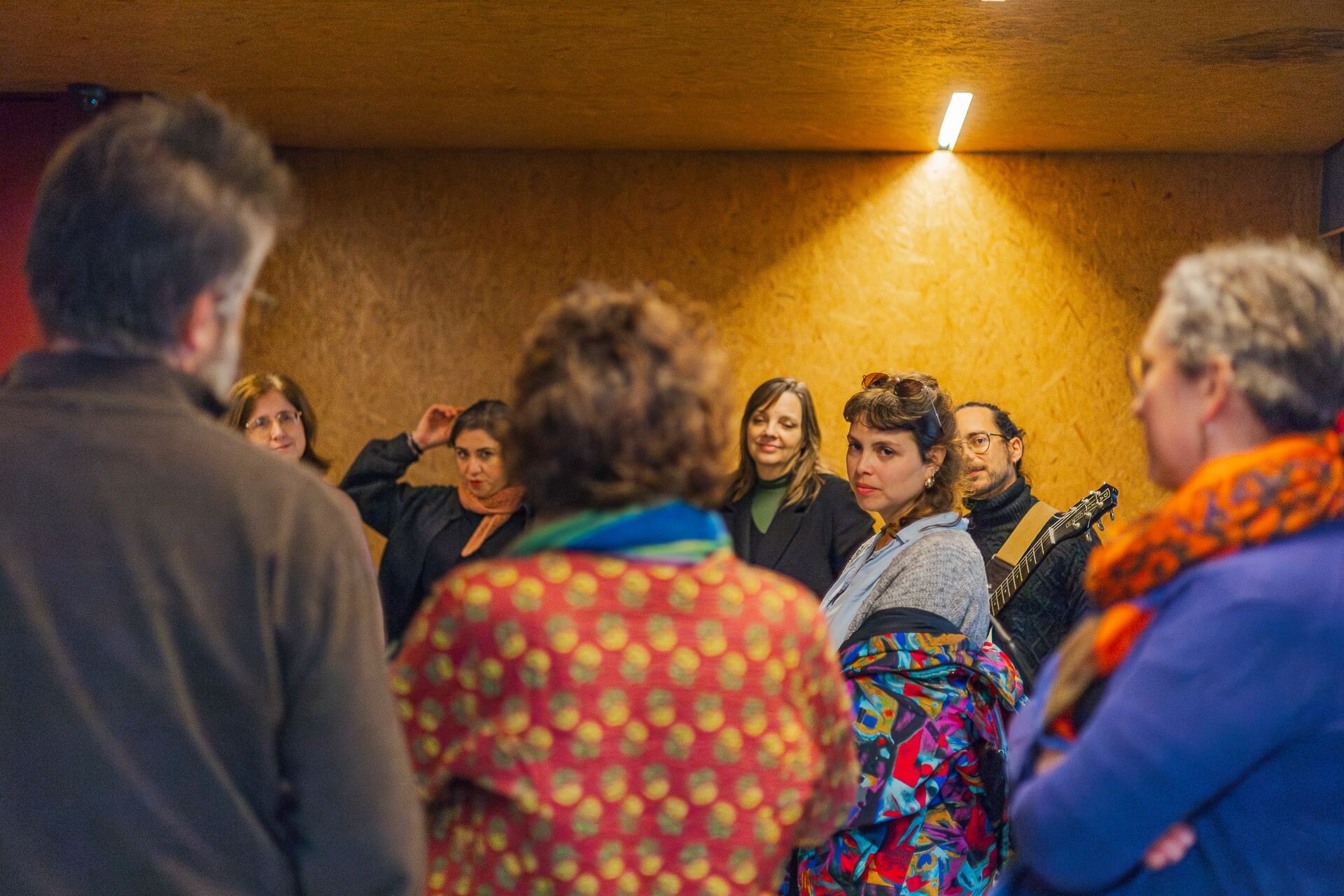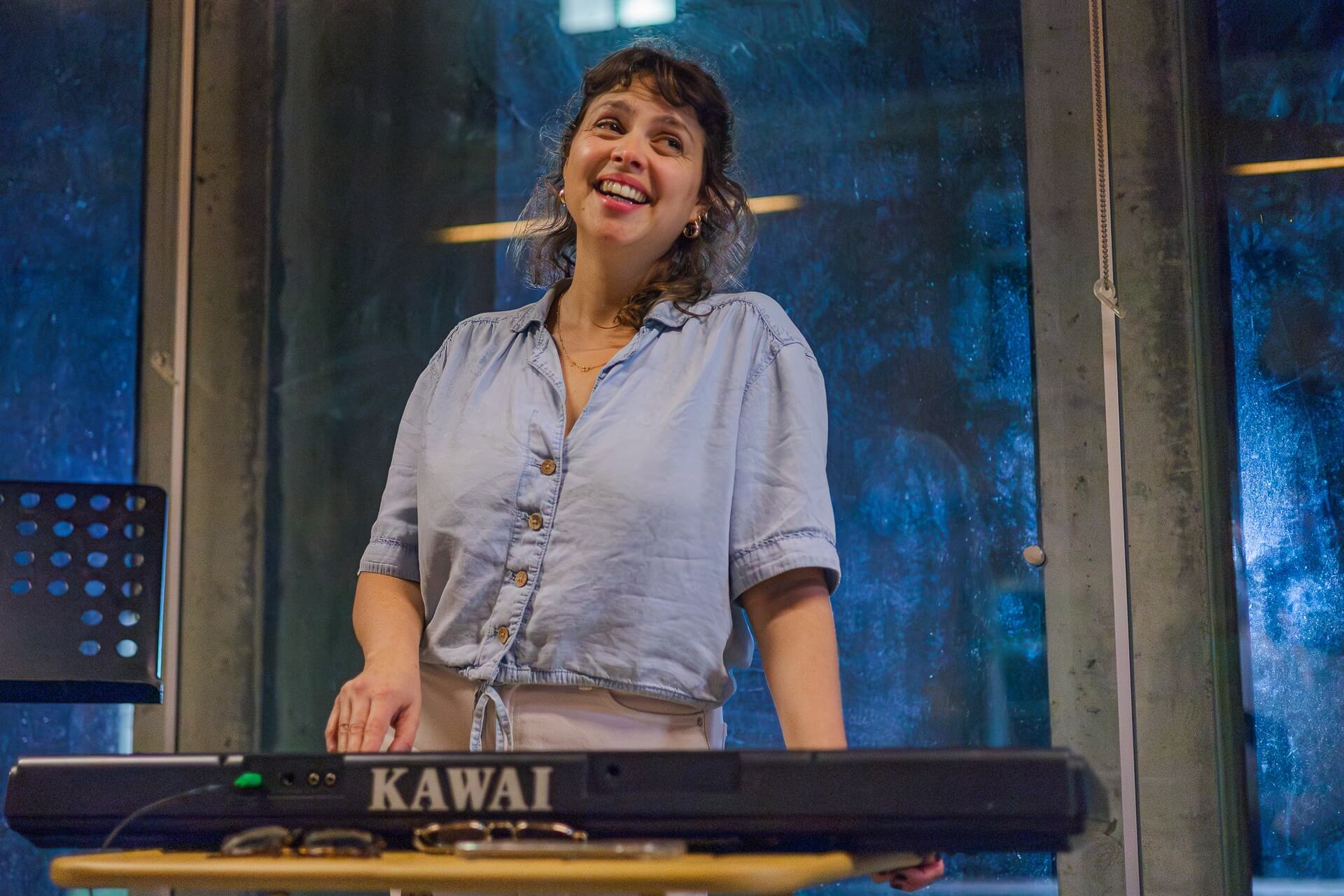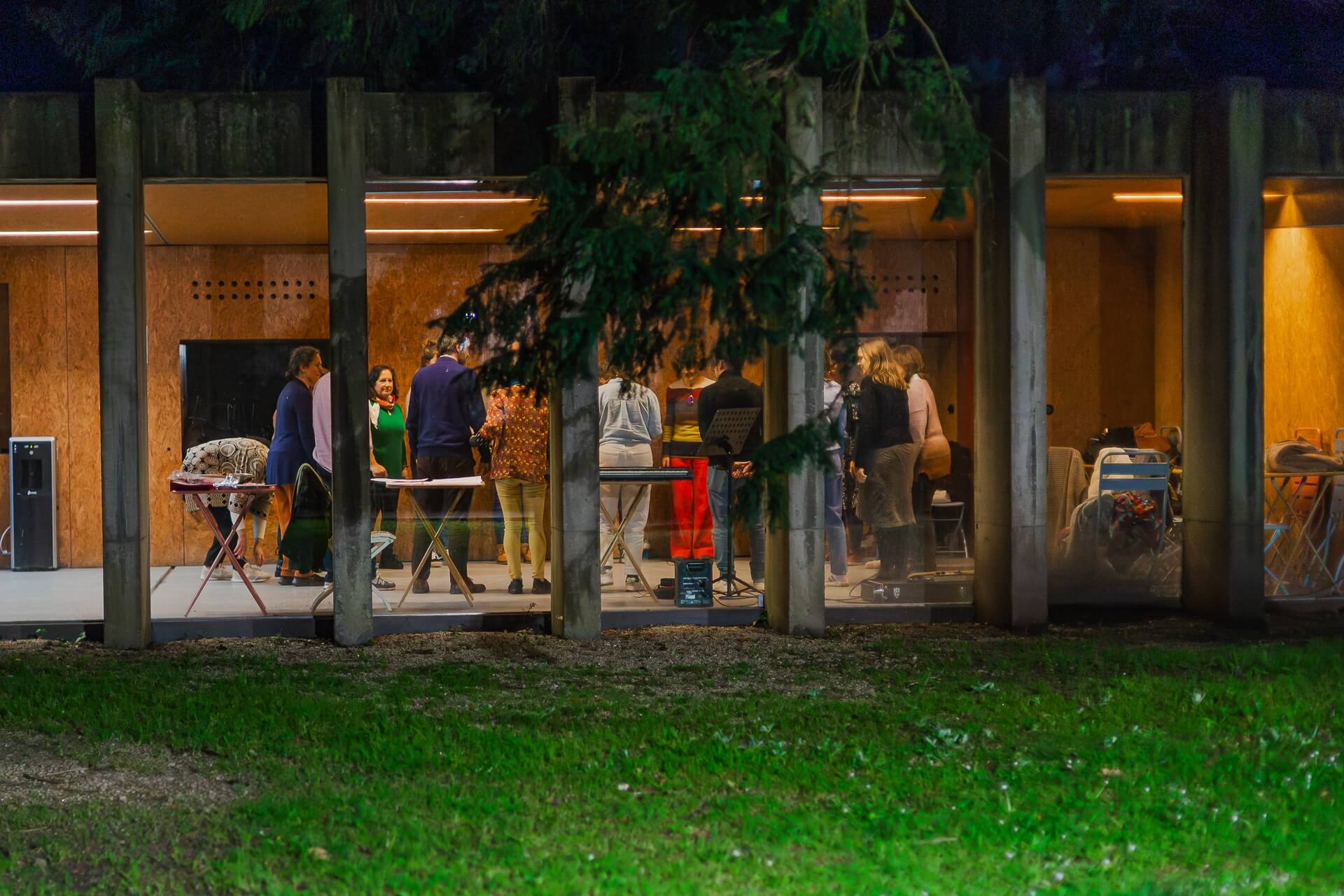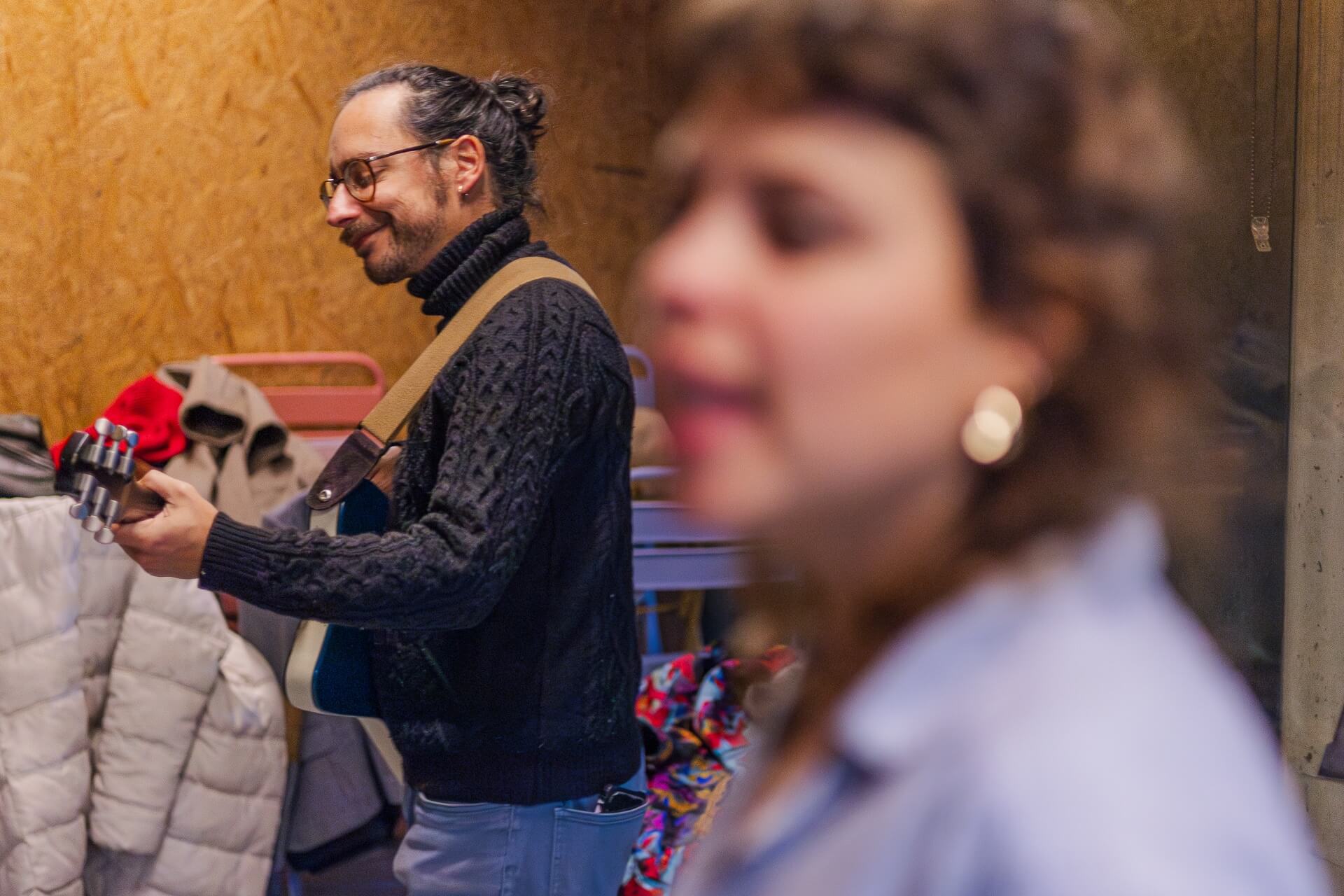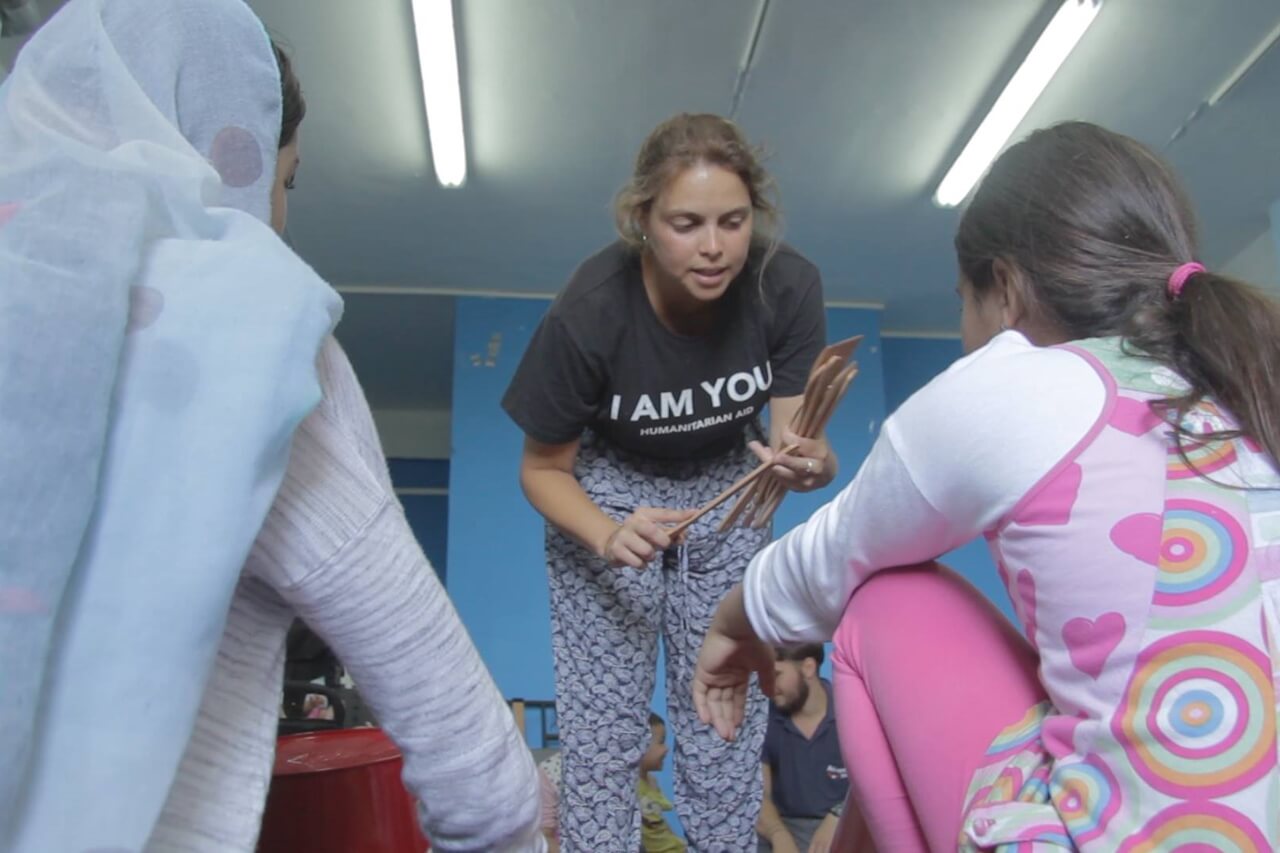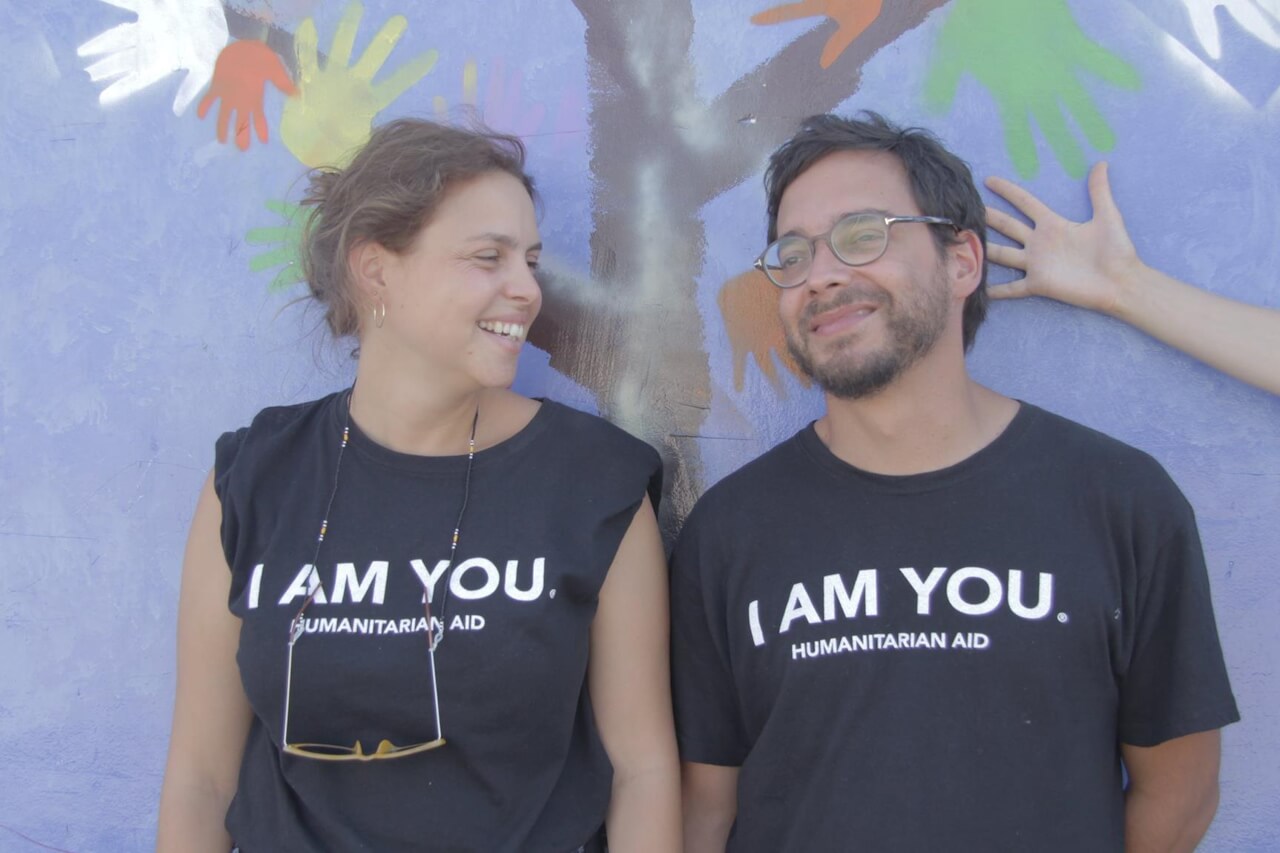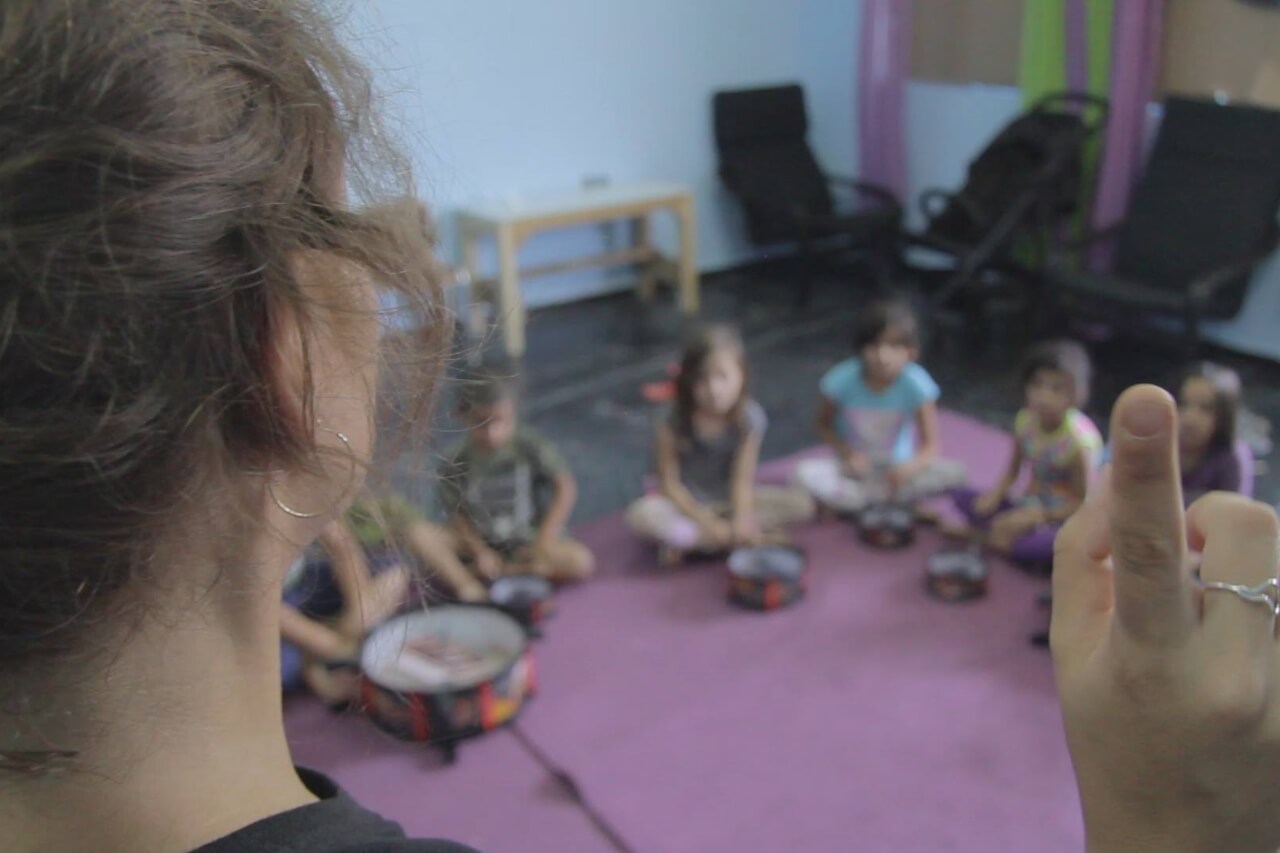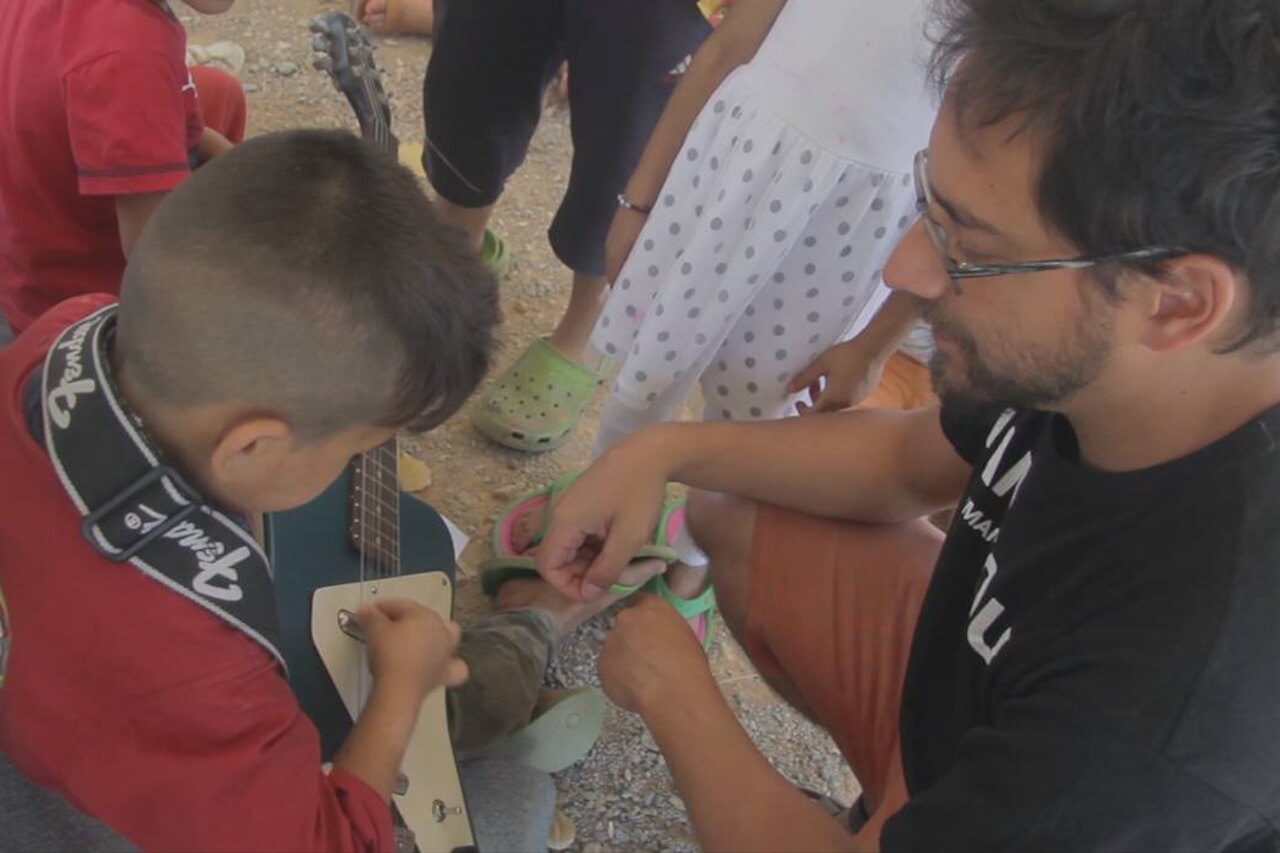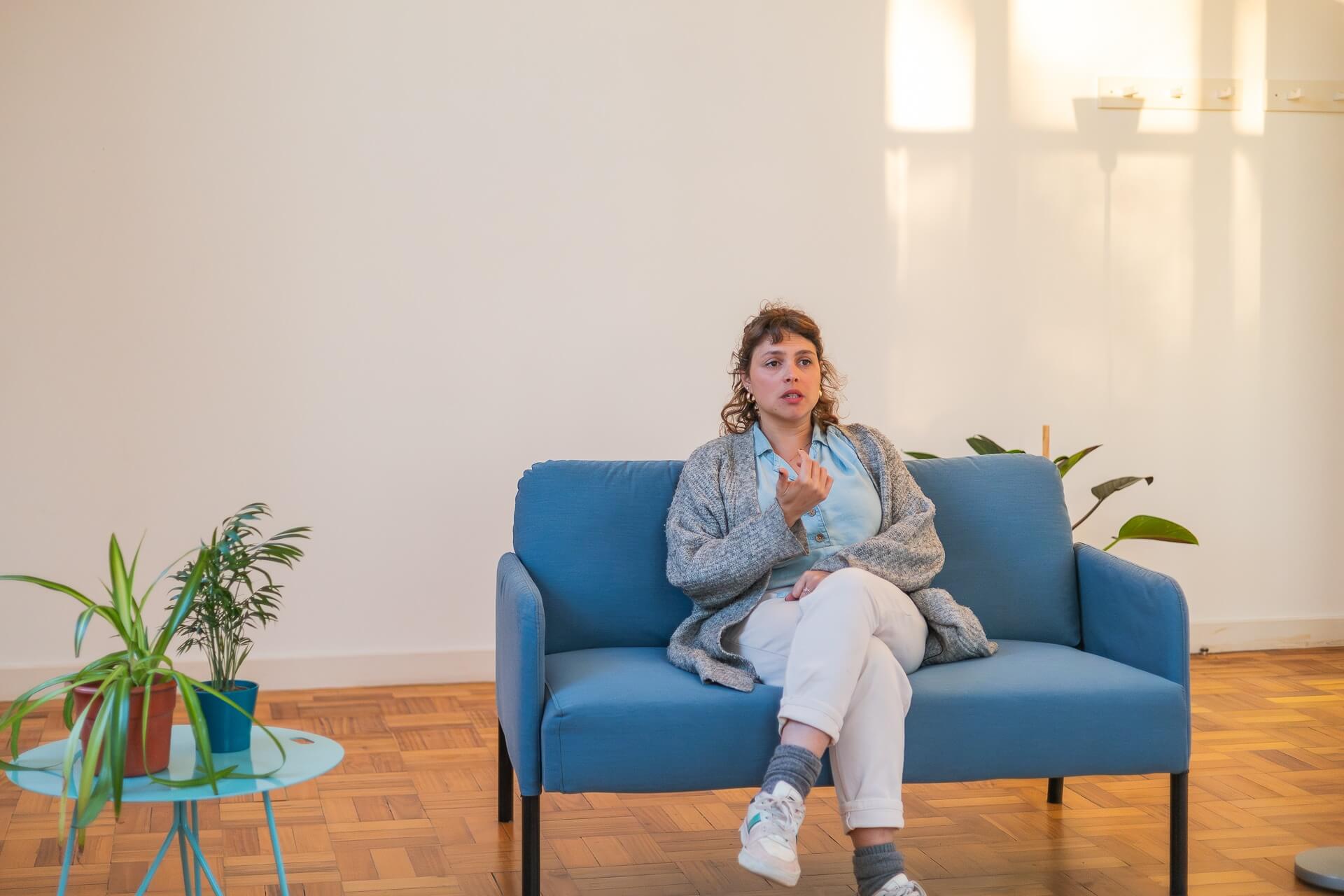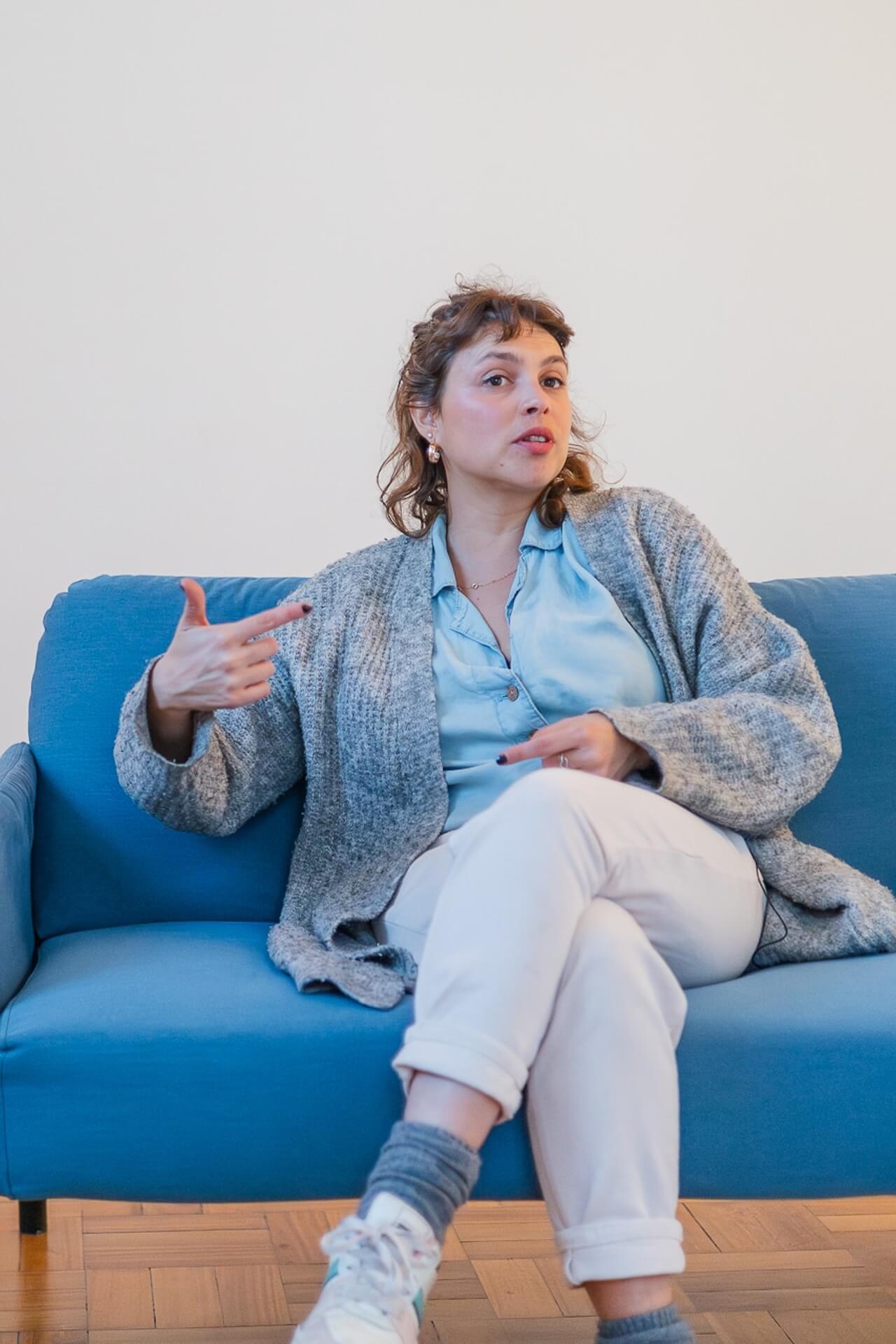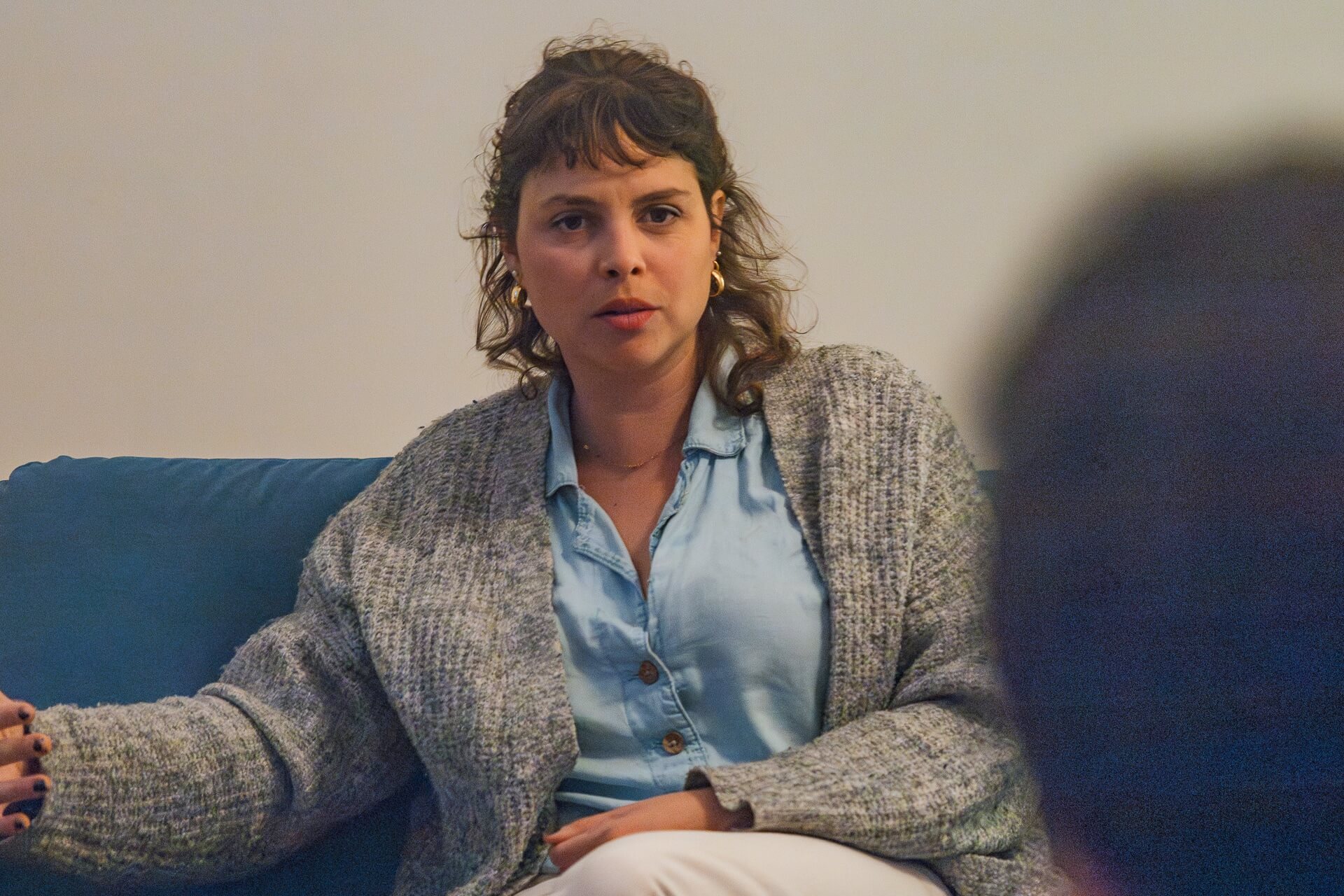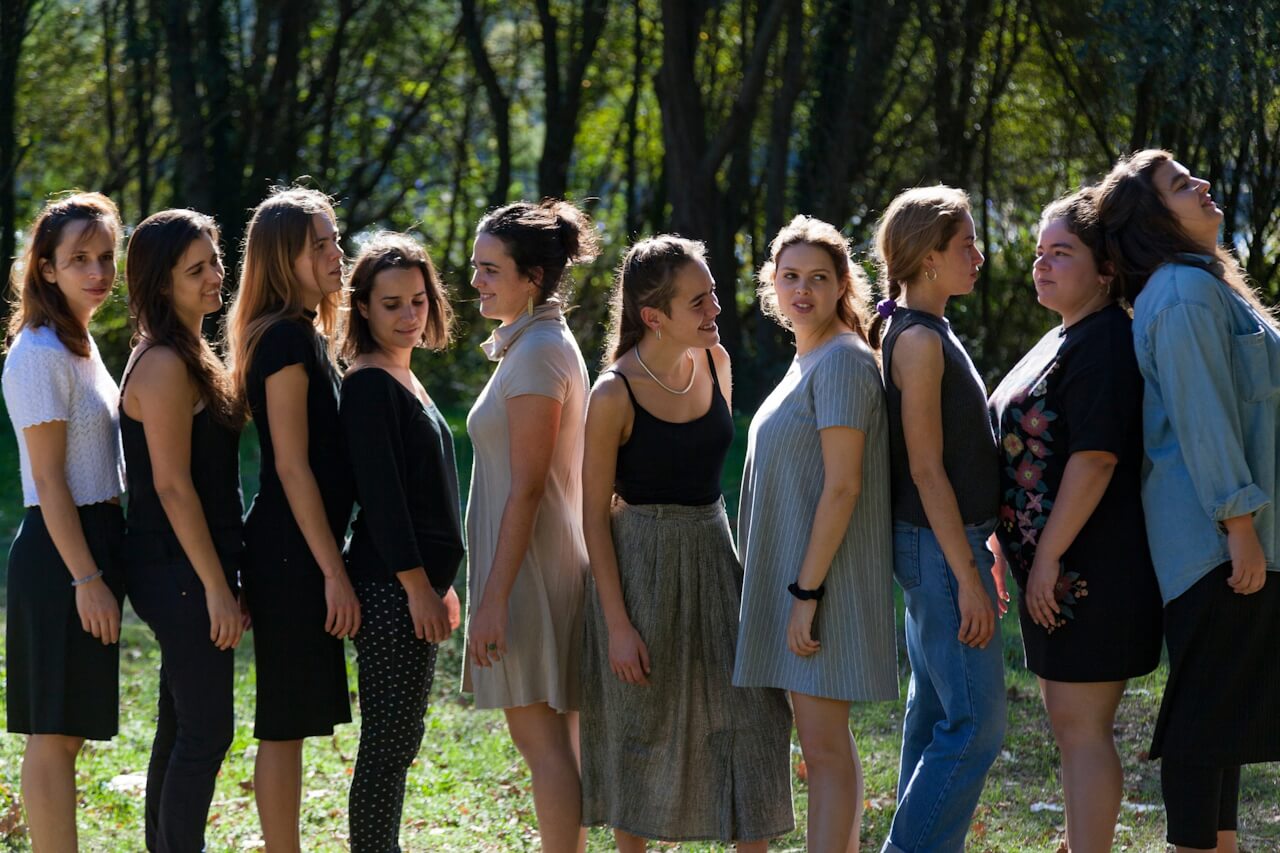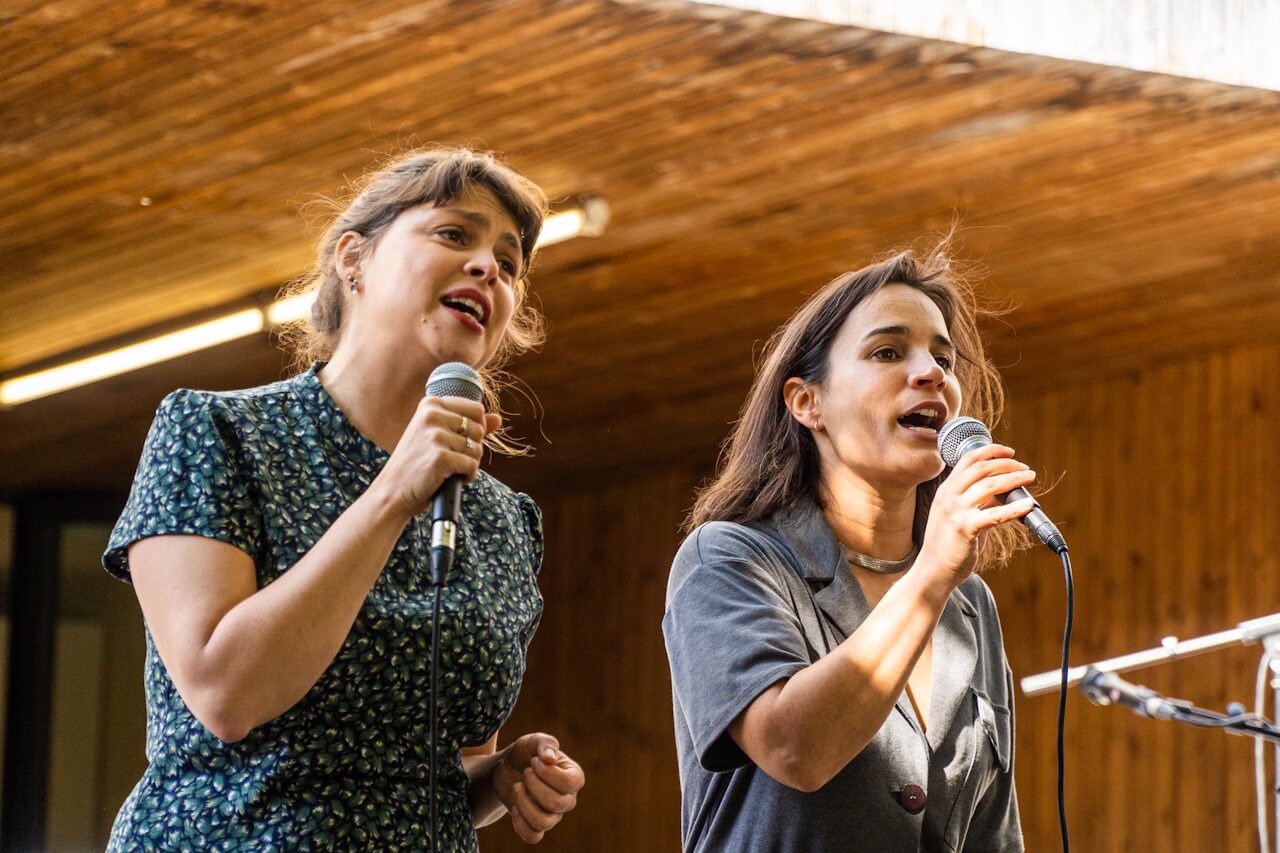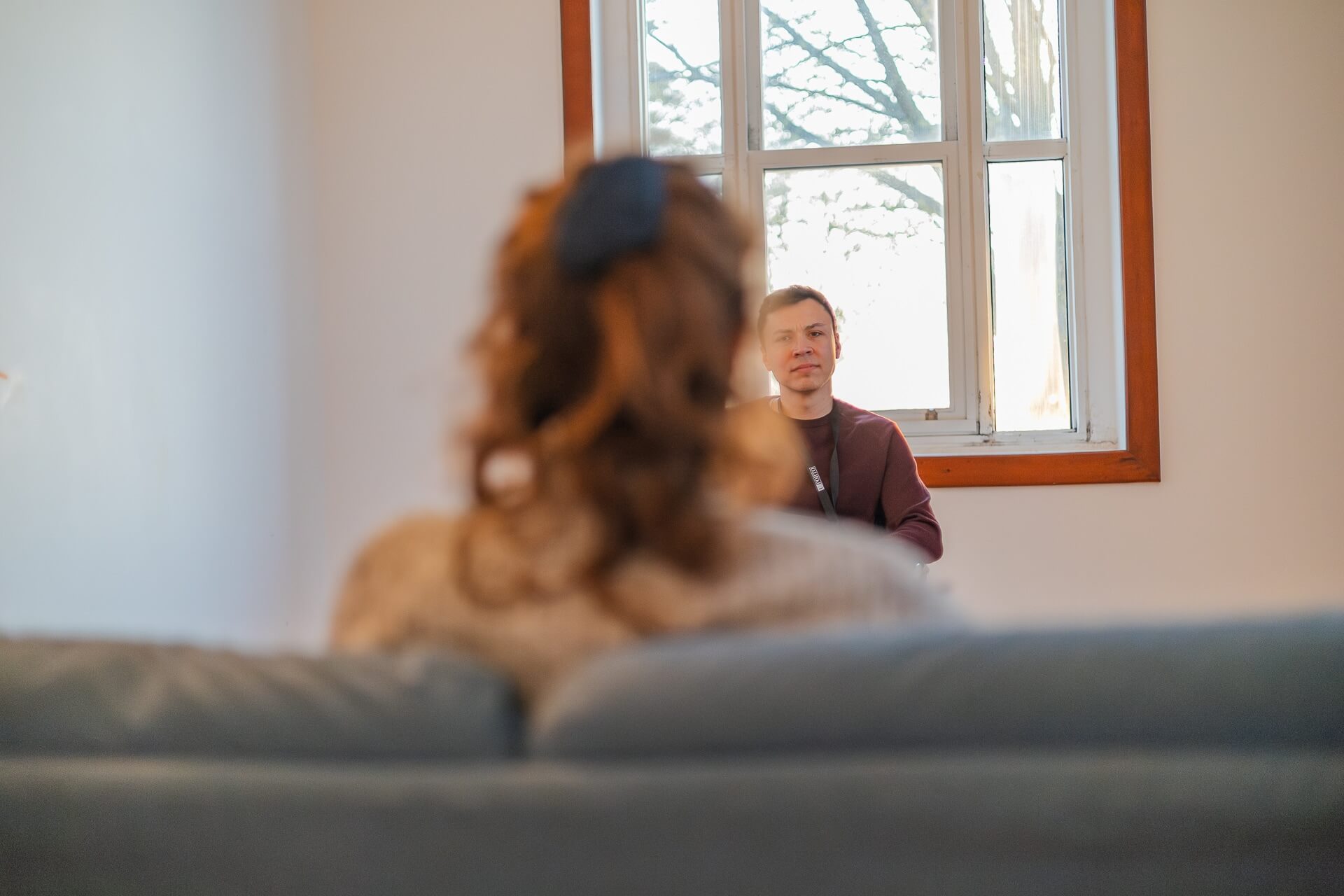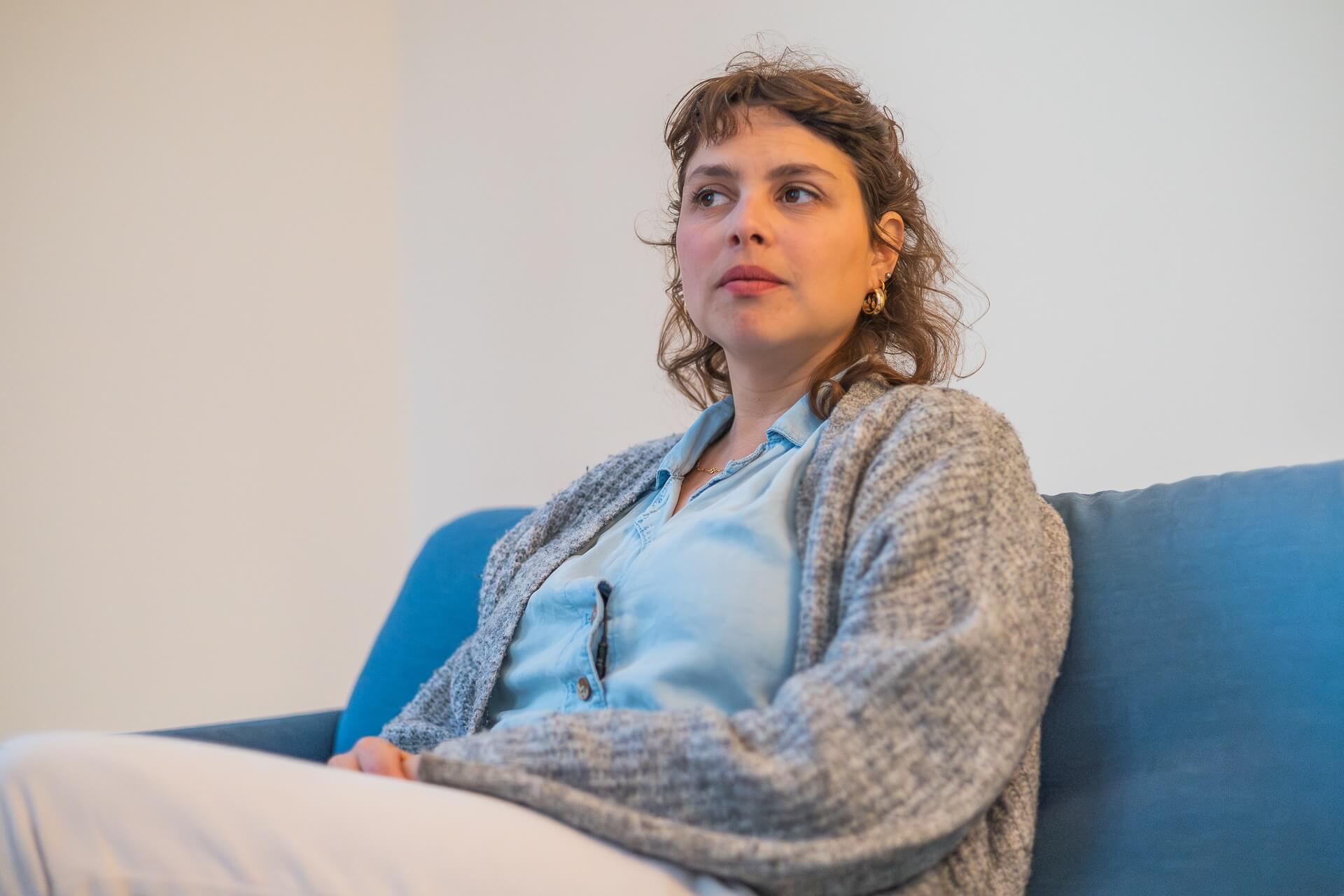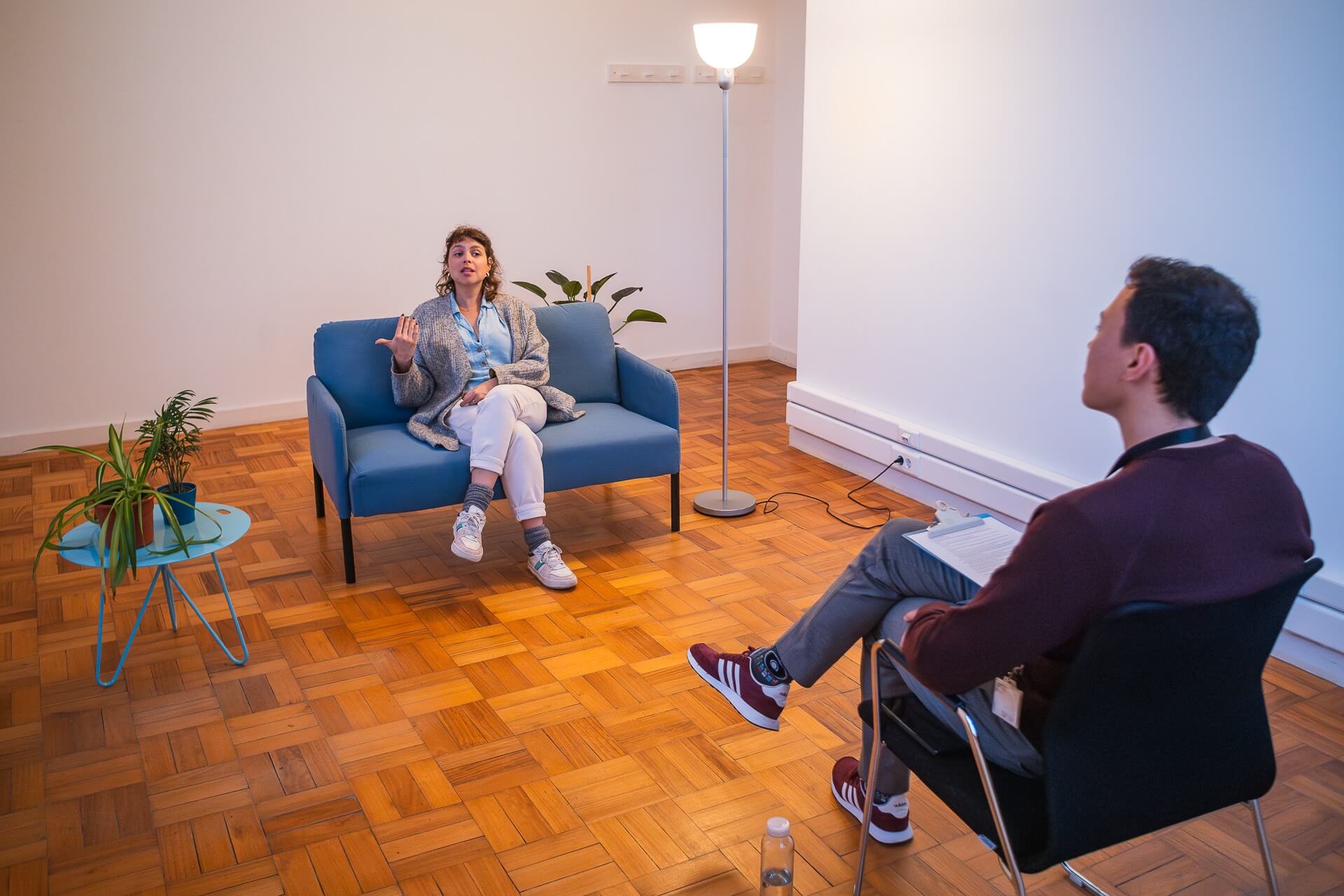Rita Campos Costa: “An artist’s work is very similar to that of a scientist”
Rita Campos Costa: “An artist’s work is very similar to that of a scientist”
After ten years of provocation and irreverence, Rita Campos Costa is ready to let life go easier. She has helped children and adults grow up to the sound of music, and it is on this note that she impacts the lives of many communities. In his batch of "Gambozinos", she found the "Sopa de Pedra", and currently, she does not dispense the "condiments" to let her brain rest to be the creative force that it is. Don't miss this edition of Out of Office about the mentor of Frenesim, but... It's to read calmly.
Rita, what is Frenesim?
Frenesim is a cultural cooperative based on communication between people, territory and art. Our job is to carry out artistic projects of community insertion, that is, to work with a territory, to work with people in a community who have something in common, and to use art to bring them together. For us, community is a group of people with something in common.
How do you activate these communities?
Our job is to bring them together and make those people a fertile community, and we do that through art. It starts with minor artistic provocations; we use games, creative and community dynamics, and we begin to take information from the community and build an artistic process. A show may emerge at the end of this artistic process, which happens most of the time. A get-together, a dinner, a surrealist banquet where no food is eaten – something we would really like to do for the whole of UPTEC -a sound installation, an exhibition like the Loop Station we did at UPTEC Baixa, where it was a way of being in a frenzy… You had a phone that rang, someone was talking to you, who asked you a question, you left your answer and recorded, you had a mirror that allowed you to see what was behind you, you had compliments to go on your colleagues’ coats when you don’t know what to say to them, and so it’s very much this: it’s provoking, tease, tease.
And what kind of communities do they usually work in?
We work with groups of people who have something in common, whether it’s the place where they live, for example, working people from a social housing estate, where we can think, “Why is this neighbourhood like this? What do we bring to the neighbourhood? And what does the neighbourhood bring us?” We work with institutions, for example, one in Esposende for people with dementia, we work with large companies or smaller teams, and we work in mental health with Santa Casa da Misericórdia, among others.
A job that you think is valued?
It looks abstract and intangible. So what do you do? Sometimes, it is confused with those workshops, team-building exercises of “let’s all sing” or “let’s all paint.” No, it has much more to do with the lyricism that life brings us, beauty and clowning, than doing something very well.
And how did it all start?
A while ago… on the island of the Sun (laughs). Frenesim was born when my first child was born, and it wasn’t by chance. These stories are inseparable. I got pregnant unintentionally, known to everyone, with Zé, my partner in Frenesim, who wasn’t even my boyfriend, so we decided to try living, making a life together. First was a son, then Frenesim, and then another daughter. Frenesim has been growing up, and he’s already 10 years old! Frenesim was born and grew organically, for better or for worse. We never had to look for work or think about what we would do because something was always coming up, which is good. And it also came about because I was teaching music.
“I like the idea that everything is always changing”
Was that where you graduated?
I studied Law but started teaching music to pay for my master’s thesis on Education Law. Teaching was much cooler than practising Law (laughs). At the time I was living in Lisbon, I moved to Porto, and I gave a lot of music lessons in colleges, schools, and homes; it was when I got bored with the idea of what we had to do and teach at school, where I questioned why we have to do certain things with the kids when they have so much more to give. I left the school, and a large group of parents from a public school told me: “Teacher Rita, now create something because we are not going to be without you”, and so it was. A month later, I asked Casa das Artes do Porto for a partnership. They made a concession to us, and we were there for six years, where we created an educational service that reached 160 people every week, from babies to grandparents. We still have some with us who are now 16 years old, and they started at three, so it really followed the lives of families and schools.
The name Frenesim where did it come from?
At the time, there was another name that was a lot stupider (laughs), but names, like band names, can be really random… I don’t know, the Beatles, it’s a ridiculous name, beetles, but then the names stick, and they sound good just because. I’m a frenzy (frenesim) myself, and I like the idea that everything is constantly changing, always happening, and always bubbling.
What made you choose UPTEC?
We ended up leaving Casa das Artes, and that’s when the invitation came from André Forte from UPTEC, who opened the door for us and invited us to go here. The idea of coming to UPTEC, mainly here to UPTEC Baixa, would be to create a network between companies. More than a work network – because we end up each being in our own office, we all have a lot to do and, therefore, it is an illusion to think that we are going to create a great work network, but rather a network of some recognition of “we are here, there is something that unites us, and it is not just a space where we come to work”. This was one of our big goals. We created the adult choir at night, we created an artistic laboratory, also every Wednesday, but in the morning, both free for the entire UPTEC community, where the objective is precisely to work on the Frenesim methodology, to work on the artistic and community process, to create projects with adults who want to come and learn how to develop projects with their hands in the dough. We don’t work much on theory, we work on practice and inform with theory.
What do you like most about the UPTEC community?
First of all, the place where we are. UPTEC Baixa is inspiring. This garden is incredible, and this building has an excellent feel. We have some wonderful neighbours. We like to talk a lot about our neighbours. We like this idea of working the neighborhood, wherever it may be. Now, it’s no coincidence that it’s an incubator. We are a creative, artistic and cultural industry. We are neither scientific nor technological, although we use technology in an artistic sense. Zé, the other side of the artistic direction, is a composer and an electronic musician. Much of our work, including with babies, is very focused on electronic music and the potential of technology in art. Still, we are a cultural and artistic cooperative, so there is no time for everything. Our work is very much outside, but I would like something for everyone, something done in person. These provocations are happening, which makes the companies somehow unite, and there is a feeling that being here at UPTEC is not the same as being anywhere else.
And is this "Coro em Movimento" an excellent way to energize the community, whether UPTEC or external?
Yes, the idea of creating the choir is because we all know how to sing. This is my fight. Singing is for everyone unless you have a severe hearing or vocal cord problem. Singing is a workout. I’m often asked what I can do to sing well. And my answer is “You have to sing a lot”! If you draw one a day, you’ll draw much better at the end of the month. It’s like making leg splits, unless you have a leg missing or serious joint problems; if you train your elasticity daily, you’ll be able to do it, which is the foundation. There are a lot of people who are afraid to sing, think they are out of tune and are ashamed, and that is why we created this choir, which has existed for many years; it already existed before we came to UPTEC. The choir is older than the Frenesim itself, and we like the idea that “everyone fits here”. People even say, “If I sing badly, kick me out,” my answer is that the magic comes from the voices altogether.
And who is part of the choir?
We have very different people in terms of professions, shapes, and references. We really have nothing to do with each other. However, a small bubble of space and time is created here, a feeling of school, of summer camp, of Erasmus. On someone’s birthday, they bring a cake because they’re going to party with the choir family. Then we leave here, we’re in the centre of the city, we’re going to have a snack, and we’re going to have a drink.
“If I’m asking people to engage emotionally, intellectually and artistically, I have to do that too”
What do you usually sing?
We usually sing Beatles (my favourite band), Zé Mário Branco, Portishead, Mercedes Sosa… Fantastic music and artists. The repertoire is very relaxed; we don’t think a choir is made by tuning, but because we enjoy a song together. After that happens, we’ll work on the technical part. First comes the personal part, and then comes the technique. I think that many times, artistic proposals, and not only in fact, are the other way around.
There is a great passion for this project.
Undoubtedly. People who come to the choir are also looking for a hobby, aren’t they? I usually leave work and turn off the radio. It’s the opposite of my day; it’s silence. However, all these artistic and cultural activities that we provide, and that intersect with the hobbies of many people, is already my work. And you can’t do this without pleasure. A year ago, for example, I stopped working for three months because I felt this was not going well. This job asks a lot of us because if I’m asking people to get involved emotionally, intellectually and artistically, I have to do it, too. Then there is the Portuguese and international conjuncture because artistic work, in culture, is precarious. So we look for a job that gives us pleasure and that asks a lot of us because it is something that we already know is not to get rich.
Doesn't that feeling get in the way of your creative process?
Lately, I’ve been discussing the difference between creating and producing. Artists started developing as producers, which was evident in the pandemic. You had to produce to have money, including proposals for state support. You always had a function, as if art had a function that didn’t serve itself, and that’s the big discussion; that’s why there’s not enough artistic support. It has yet to be realized that art is important just because it is. Not because it’s essential for brain development, because it’s important for math, etc. No, it’s important just because it is, because it’s with art that we question ourselves. By asking ourselves, we are developing ourselves.
These projects, such as instant choirs and concert workshops for babies, end up demanding a lot from you...
There are hectic working days; every Wednesday, we work from 9:30 a.m. to 10 p.m., so there has to be time to do nothing without shame. We stop every year, a whole month in August, 15 days at Christmas, 15 days at Easter, and still, we take a vacation in the middle because the brain needs to be soaking to develop new ideas. Zé and I, who is also my life partner, learned that we have to stop, tune in, and not stress if the ideas don’t come soon. We’re going to stop everything we’re doing, and we’re just going to be good together, talk, and think about this project without the pressure of coming up with ideas. We’re going for a walk, we’re going to the beach, we’re going to have lunch out, we’re going to do things that we don’t usually do because the human brain is lazy. You will always follow the easiest path, which is not the one of creativity but the most predictable, so forcing him to follow new paths is essential.
Without creativity, there is no progress?
There’s a fascinating book from Planeta Tangerina called “How to See Invisible Things – Observations, Experiences, and Questions from Artists, Scientists, and Other People with Imagination.” It’s a book that compares science with art. It’s very interesting because many see we are part of a science and technology park. They ask what it has to do with us. The reality is that an artist’s work is very similar to a scientist’s work in the sense that our work doesn’t come from “ah, I had a great idea”, but it comes from observing reality, organizing reality, shuffling everything, perceiving the variables, reorganizing them, categorizing, standardizing and realizing, through references of what you hear and error-action exercises, if you can reach new places, and this is the same with science.
Your community work journey includes visiting a refugee camp in Greece in 2017. How has your work tried to help that community?
In fact, I don’t like to talk about this topic or about this work, and I can explain why… First, there is always a certain embarrassment and shame, which has to do with the idea that you are there too little time for what those people need. And it’s impossible not to leave there with the feeling of “You go there, do some things and leave, go back to your amazing little life that you have here, to your T3, with your kids who eat cornflakes for breakfast”, and that makes me a bit confused in the sense that this world is a horribly unfair place. On the other hand, I found out in the refugee camp that I was pregnant with my second daughter, and therefore, I have very strange sensations. I was permanently nauseated. We went to an Afghan camp whose war has never ceased to exist, and some people are there and who are going to die there because it is a camp that has been established for a long time. So, working there and thinking, “This is what’s left for them”, is a complicated feeling.
How do you mitigate that feeling?
Trying to train the people who are there for a longer time. For example, we currently work in a rehabilitation clinic. When we get there, we have such a significant and differentiated impact that people who are there every day ask us how we were able to bring a series of things that positively influenced the patients. Of course, that is quite unfair to those who are there daily, taking care of them. As such, we try to start working in a way that empowers the people in the places and gives training so that our effect can be multiplied. This potential for continuity is significant to me, and I learned it in the refugee camp.
Have you focused on working more with children?
Initially, it was with children from six to nine years old. Still, at a certain point, the parents of the children started knocking on our door, saying that they would also like to work with us, and then the teenagers came, so we ended up working with the whole camp. In the end, we wrote a book that stayed there, where we established and framed the Frenesim methodology, why we work like that, the work phases of a session, work phases of a project, what to take into account, how to make something happen, we wrote artistic references, icebreaker games, and it was the first time we segmented our way of working.
What do you consider the most positive moment throughout these ten years of Frenesim?
Now! We have a series of changes, other things not so good, and many projects, but I’m very calm, and that’s amazing. It’s the feeling that no one will die; nothing is urgent. I’m not a doctor or a judge; I can do things calmly. The world won’t slip out of my hands. It’s this feeling that everything is fine; I’m seeing the way, working on projects and having a sense of tranquillity because we already have the year 2024 closed. Still, you’re constantly having to think about what’s coming next. Despite this, I fully possess my abilities and am not afraid. We’ve worked so far to make it happen this way. I am sure that what I do is very well done. From the moment I started working less and prioritizing, I did twice as much. I’m working much better because I’m no longer lost in all my roles. There’s now a line of thought that I always do my best, but sometimes you don’t, and that’s okay because if you’re always giving your best, that’s when you get to the end of the day and have nothing left to give. I come home and have children; in what condition will I be with them? I have to be okay, so now I feel very good.
Gluten intolerance didn't remove her desire to discover all the colour the world could give her. The different stimuli she has had throughout her life have opened up the spectrum of creativity. In a journey full of chances, there is nothing like her favourite word, capable of making the most puritanical blush in red, to be the catalyst for one of her life goals: not to feel "yellow" and to go live for a year, with his children, to the green purity of the Azores.
How were your first years of life?
I was born in Porto on July 18, 1988. I was plotted in my first years of life; I’m learning that now in the psychologist (laughs). I leave nothing to say! I heard that they were plotted because I have celiac disease, which means that I can’t eat gluten, something that is fashionable, but I really can’t; I’ve had a disease since I was born, so I spent the first two years of my life, according to my mother, crying full of pain, but I don’t remember anything (laughs).
And where did your artistic side come from?
That idea that things are born with us is a fallacy. It’s even said that art is 10% talent and 90% perspiration, so only if it’s that 10%. I have a curious personality type, and the basis of this work is being curious about the world. I remember forever that my dream was to be famous (laughs); it wasn’t to be a musician or actress but to be famous. How ridiculous, isn’t it? (laughs) And I remember that my big problem was that the day I was famous, I was going to walk the runway, and since I didn’t know how to walk in heels, I was going to fall (laughs). But I’ve studied music all my life, which shaped me a lot. Not only the music but the way I learned. I learned from age three to 18 in a school called “Gambozinos”, a cultural association of the post-April 25 period, very important at that time, very revolutionary, and very resistant. It was a school of life, and although I was there studying music, it had a lot of activities, including “Pensar ao Lado”, which was on Saturday mornings. My best friends are from there. I was a teenager, and we used to go to “Pensar ao Lado” on Saturday mornings to talk about world issues. Reading the news, understanding what was happening and what they were saying. Reflect, associate, discuss. And it was a very different form of music. I sang from a very young age with Sérgio Godinho, Zé Mário Branco, and Amélia Muge, who, for those who know, are very important people. I often felt out of place, even though I was pretty unembarrassed at school because I listened to these kinds of songs, and the kids didn’t listen. And I was the only one not baptized; it was also complicated. My primary school teacher used to say: “Look, she’s the only one who isn’t baptized” Diogo Reis and I were very ashamed (laughs). I asked my mother to be baptized, and my mother replied, “It may be, but you have to go to catechesis; you are not just going to be baptized. But to go to catechesis, you must leave the Gambozinos and the music. Do you want to?” And I’m like, “No, never mind” (laughs).
How did you come up with creating "Sopa de Pedra"?
Most of my “Sopa de Pedra” friends are from the “Gambozinos”. It came about unintentionally, as with everything else in my life (laughs). I got pregnant unintentionally, I went to law school unintentionally, and everything in my life is unintentional. I haven’t told you this part yet, but I was even going to theatre school. I always knew I was going to the theatre, but when I went to hand in the ENES form, I found a colleague there, she wasn’t even a friend from school, who told me “I’m going to study law, what about you?” and I said, “I’m going to theatre”. “To theater? What a waste, you have an average of 18, why do you go to the theatre?” so I enrolled in Law there… And you know that Monty Python story, coming home and saying to my parents, “Mom, Dad, I’ve got something to tell you. Don’t get angry, but I’m going to law school anyway”, and they went (laughs). But I went anyway and loved studying Law. There was so much to learn. I loved studying here at FDUP, and that’s another reason why I like being at Baixa so much. I looked at FDUP, and I remember that I was very happy. And with the band, it was the same. We were friends, we hung out together a lot, we sang a lot, and once Pedro Lamares, who is an actor, and who was often with us, said that we should go sing to “Pinguim”, and then someone else, who was a band manager, said that he would get us a tour, and that if it went well, that he would stay with us (laughs). Our band has ten members, and not all were in the Gambozinos; we have a web of unbelievable relationships. Two of them are sisters. Two others are direct cousins on both sides, so two brothers married to two sisters. I am a third cousin of these two. The two sisters lived in Macau and lived there with one another simultaneously after being school friends and never seeing each other again. Then, I ended up living with one of the sisters in Lisbon. The other sister did Erasmus with another friend of ours in the Netherlands. These two then lived in London. Then, four of them lived together, and our life has always been like that. We lived together many times with each other, and a band emerged. It was really by chance.
And how is the project going?
It’s not standing still because we get a lot of invitations, but we have to turn them down because we’re all busy with our projects. I have Frenesim; it is not stopped by a lack of public interest but by a lack of our hand in this.
It's almost like arranging a dinner party (laughs).
It isn’t easy, and then things start to grow. If before it was “let’s sing there” and we went, suddenly we became one of the first women’s bands – there were already many associations – to collect traditional music, to bring it to the contemporary, to remake it, and to function as a band and not as an association. The decisions on the projects that we can accept are made unanimously. We’ve been asked to be featured in television commercials, and all it takes is for one to say no, it’s not done, and we’re all okay with that. Participate in Eurovision? No. Now go sing on April 25 at the São Bento Palace? We don’t have the conditions for that, and we’re okay with that. So we don’t have many concerts because it’s difficult to reconcile everything. Still, we’re going to Paris to sing on April 25.
What else is most indispensable in your life?
Vacation. I don’t know if you’ve ever asked me this or if you will ask, “What do I need in my life if I could choose one thing”? More money. More money to have more vacations. So that you don’t always have to think and do the math. It’s not just money accounts but strategic, life accounts. For me, it is essential to rest. It’s get out of here! It’s not always having the guilt of working (laughs)! It really is indispensable. It’s leisure, and leisure is not a hobby. Leisure is being with friends, going out to dinner, not always being in a work loop, and feeling like I have things to do. In our world, work is endless; it never ends. So, for me, vacations are an absolute must. I will take a vacation in two weeks because we are in a challenging work period. We’ll spend six days away with our kids, and in a month, we’ll go on another six-day trip with Zé and me. It is indispensable.
“Five years from now, I’d like to take a year off with my kids”
Where do you see yourself in five years? Do you usually make long-term plans?
Nothing, some say, “One day I’ll go to Frenesim, and I’ll make your business plans” (laughs). Nothing, I don’t know. I have no idea. It might not even be here; there might not even be the Frenesim. I’ve had a lot of attachments of “this can’t end”, and now I don’t; it may not even exist. I don’t know what’s going to happen. Good stuff, that’s for sure. I assure you I won’t have any more children and enough sleepless nights (laughs). Five years from now, I’d like to take a year off with my kids. It’s something I wanted to do, but then the pandemic came. Living for a year in the Azores, a year in which my life was completely different. I liked it a lot, but in five years, maybe they won’t call me anymore (laughs).
What is your biggest flaw?
We don’t have virtues or defects, only characteristics. My greatest virtue is, in fact, my most significant flaw. It has to do with how you use them. I’m curious, willful, and always go where I want; I’m extroverted and creative, which is also my biggest flaw. It makes me more anxious to take other people’s shoes, and maybe I don’t trust other people’s ideas as much because I’m already there. So, this is my theory, and this is the basis of Frenesim. It’s how we use our traits because they’re not defects or qualities. What annoys you the most is the other side of the coin, which is where you are most precious. Always try to improve your flaws as if they were wrong instead of trying to frame them and understand how they are helpful and not. Being seemingly too extroverted is all good for many things, but on the other hand, it’s a constant burnout, and it can be a big problem. That’s my theory. It has to do with how you use them.
Favourite word?
Do you want me to tell you? You can’t write it, can you? It’s fu** i* (laughs). Now, more seriously, it’s the word “yellow.” Yellow is a great word. That’s all. It’s light. Yellow is everything! But my favourite colour is red, just so happens (laughs). I’m pretty incoherent, I make a point of not being coherent (laughs).
Do you have any dates that are engraved in your memory?
The date my children were born… I have to say that, don’t I, or it makes me look bad (laughs). But look, I have another date, the day I went to law school. I loved being in college. I don’t know the day, but it was in 2006. Going to this specific college allowed me to meet many people from small lands who dream of becoming a doctor, and I came from a school of “upthigh kids”, betos, and from a family of left-wing pseudo-intellectuals; the opposite, therefore, it was adorable to perceive other worlds completely different, people utterly different from me… My parents, of course, are against it, and it was really cool for me to relativize myself to understand other ways of living. 2006 was a year of change for me.
Finally, tell me three things you would like to do. You've already told us one, take a year off with your children...
I want to be big (laughs). I don’t know if you feel that when you saw your parents, at our age, they looked big. I often think, “Where are the adults to help me make these decisions?” (laughs). I liked being “big” and having my whole life oriented… I need someone to take care of me (laughs). But when I think about it, I don’t want to be too big (laughs). It takes a lot of work to do this… You know I’ve never been a person to think about my dreams, to have that lyrical vision of life… You have to understand how to take pleasure and benefit from what exists and what happens. Life is a fluke. For me, who is an atheist and entirely unfettered, life is a fluke. It’s a coincidence that we’re still alive. It’s a fluke that people die. And as it happens, we manage to be happy. And that’s how my life is. The trick is to know how to take advantage of what exists. Not so much what life gives us but knowing how to surf what exists. I’m at a stage where I already know that there are things I won’t do in my life. I’m not saving money to travel. I know I don’t go to places because I’m not saving enough money to go to those places in the space I have left. Mercedes Sosa has a line in a song, “Volver a los 17”, which says, “You’re old enough to do anything you want, and you’re young enough that nothing is important”. The best phase of my life was at 20 or so when I already had money. You think you can do everything, but now I started to look, and I see that I’m going to have to choose what I’m going to do, and then I feel like I’m not an adult yet. I’m already feeling it, but I refuse to choose despite the perception that there’s a lot I won’t do anymore. It’s the first feeling I’m getting old (laughs), the first crisis in age.
March 28, 2024
